The Cambridge Analytica Scandal, in Three Paragraphs
What it means for Facebook, for President Trump’s world, and for every American

(If you want to skip the preamble, see below for the three indented paragraphs. I promise they’re here.)
The Cambridge Analytica scandal is suddenly a major problem for Facebook.
On Tuesday, the Federal Trade Commission opened an investigation into how Cambridge Analytica, ostensibly a voter-profiling company, accessed data about 50 million Facebook users, according to The Wall Street Journal . It’s not alone: The GOP-controlled Senate Commerce Committee demanded answers from Facebook on Monday, as did Senator Ron Wyden , a Democrat of Oregon.
The social giant’s stock has also lost about 12 percent of its value since The New York Times and The Guardian broke the first stories about the scandal over the weekend.
The scandal sure seems like bad news. But last night, I thought about all I had read about it—and I realized that I was not actually sure what the underlying scandal was. I was especially unsure of the scandal as it involved Facebook. The case is just complicated enough—and there has been so much reporting about every facet of it—that I never fully understood the underlying problem.
I get it now, thanks in part to help from my colleagues. But if you’re in the same boat as I was, here is my summary of the heart of the scandal as it involves Facebook, in one paragraph :
In June 2014, a researcher named Aleksandr Kogan developed a personality-quiz app for Facebook. It was heavily influenced by a similar personality-quiz app made by the Psychometrics Centre , a Cambridge University laboratory where Kogan worked. About 270,000 people installed Kogan’s app on their Facebook account. But as with any Facebook developer at the time, Kogan could access data about those users or their friends . And when Kogan’s app asked for that data, it saved that information into a private database instead of immediately deleting it. Kogan provided that private database, containing information about 50 million Facebook users, to the voter-profiling company Cambridge Analytica. Cambridge Analytica used it to make 30 million “psychographic” profiles about voters.
That’s the whole thing. The Guardian referred to the data misuse as a “breach,” a description which Facebook contests. “No systems were infiltrated, no passwords or information were stolen or hacked,” tweeted one Facebook executive . For its part, Facebook says it learned about Kogan’s private database in 2015, when it removed his app and demanded that he and any of his partners delete the data.
But it’s not hard to see why U.S. and U.K. lawmakers remain interested in the episode: It’s almost like Facebook was a local public library lending out massive hard drives of music, but warning people not to copy any of it to their home computer. When someone eventually did copy all that music—and got in trouble for it—isn’t the hard-drive-dispensing public library responsible as well?
There is a second part of the scandal, but it concerns Cambridge Analytica and its connection to President Trump’s political world. So, here’s my summary in two paragraphs :
Cambridge Analytica has significant ties to some of President Trump’s most prominent supporters and advisers. Rebekah Mercer, a Republican donor and a co-owner of Breitbart News, sits on the board of Cambridge Analytica. Her father, Robert Mercer, invested $15 million in Cambridge Analytica on the recommendation of his political adviser, Steve Bannon, according to the Times . On Monday, hidden-camera footage appeared to show Alexander Nix , Cambridge Analytica’s CEO, offering to bribe and blackmail public officials around the world. If Nix did so, it would violate U.K. law. Cambridge Analytica suspended Nix on Tuesday. Cambridge Analytica also used its “psychographic” tools to make targeted online ad buys for the Brexit “Leave” campaign, the 2016 presidential campaign of Ted Cruz, and the 2016 Trump campaign. If any British Cambridge Analytica employees without a green card worked on those two U.S. campaigns, they did so in violation of federal law.
But there’s still much we don’t know about Cambridge Analytica. Do its “psychographic” tools, built with the misused Facebook data, actually work ? Did various hard-right campaigns consider Cambridge Analytica so important because its technology reshaped U.S. and U.K. politics—or because using it ingratiated campaigns to Robert and Rebekah Mercer, two of the richest people in the world? And if Cambridge Analytica really was a voter-profiling company, what was its chief executive doing apparently promising to bribe and blackmail public officials?
Questions remain about Facebook’s role, too. Since the 2016 elections, public ire has focused on the company’s powerful News Feed and the role it played in amplifying Russian propaganda and other hoaxes. Lawmakers have also criticized the company’s lax sale of political advertisements to purchasers literally paying with Russian rubles. Political ads are not regulated as closely online as they are on the TV or radio.

Recommended Reading

What Facebook Did to American Democracy

Where Is Mark Zuckerberg?

Frank and Steven’s Excellent Corporate-Raiding Adventure
But the Cambridge Analytica scandal opens a new front for the company. Before Facebook became a distributor of news, it was a platform for online applications, like personality quizzes and social games like Farmville. Facebook has allowed third-party app developers to access some private user data since May 2007 , when it first opened the Facebook platform. Users must consent to giving apps their data, but sometimes—as in the case of Kogan’s app—developers can access data about a consenting user’s friends, without getting those friends’ consent.
During the ensuing decade, Facebook has occasionally tweaked how much data apps can access. But over that time, how many developers abided by Facebook’s rules? How many followed Kogan’s route, caching the data and making their own private databases? Where is that information now? And if all that private user data is as powerful as Cambridge Analytica once said it was, what has it been used to do?
A business journal from the Wharton School of the University of Pennsylvania
Knowledge at Wharton Podcast
Why the cambridge analytica scandal is a watershed moment for social media, march 22, 2018 • 27 min listen.
In the wake of the Cambridge Analytica imbroglio, 50 million Facebook profiles stand compromised. One upshot: Users must learn to protect themselves, experts say.

Jennifer Golbeck from the Univeristy of Maryland and MIT's Sinan Aral discuss the fallout from the Cambridge Analytica scandal.
Serious concerns have arisen in the past week over how social media firms guard the privacy of their users’ personal data, and how the analytics of such data can influence voter preferences and turnout. Those worries follow a whistleblower’s account to The Observer newspaper in the U.K. about how Cambridge Analytica, a data analytics firm with offices in London and New York City, had unauthorized access to more than 50 million Facebook profiles as it micro-targeted voters to benefit Donald Trump in the 2016 U.S. presidential election.
In the fallout, Facebook faces its toughest test on privacy safeguards, and its founder and CEO, Mark Zuckerberg, has been summoned by MPs in the U.K. He faces similar calls from the U.S. Congress and from India , with revelations that Cambridge Analytica worked to influence the 2016 Brexit referendum and elections in India, Nigeria and other countries as well.
U.S. special counsel Robert Mueller is already examining Cambridge Analytica’s ties with the Trump campaign as part of his probe into Russia’s alleged meddling in the 2016 presidential election. Significantly, U.S. billionaire and conservative fundraiser Robert Mercer had helped found Cambridge Analytica with a $15 million investment, and he recruited former Trump advisor Steve Bannon, who has since left the firm. The firm initially sought to steer voters towards presidential candidate Ted Cruz, and after he dropped out of the race, it redirected its efforts to help the Trump campaign.
In order to gain insights into the fallout from the Cambridge Analytica scandal, Knowledge at Wharton spoke to Wharton marketing professors Ron Berman and Gideon Nave ; Jennifer Golbeck , director of the social intelligence lab and professor of information studies at the University of Maryland; and Sinan Aral , management professor at MIT’s Sloan School of Management. Golbeck and Aral shared their views on the Knowledge at Wharton show on SiriusXM channel 111 . (Listen to the full podcast using the player at the top of this page.)
“We’re experiencing a watershed moment with regard to social media,” said Aral. “People are now beginning to realize that social media is not just either a fun plaything or a nuisance. It can have potentially real consequences in society.”
“People are now beginning to realize that social media is not just either a fun plaything or a nuisance. It can have potentially real consequences in society.” –Sinan Aral
The Cambridge Analytica scandal underscores how little consumers know about the potential uses of their data, according to Berman. He recalled a scene in the film Minority Report where Tom Cruise enters a mall and sees holograms of personally targeted ads. “Online advertising today has reached about the same level of sophistication, in terms of targeting, and also some level of prediction,” he said. “It’s not only that the advertiser can tell what you bought in the past, but also what you may be looking to buy.”
Consumers are partially aware of that because they often see ads that show them products they have browsed, or websites they have visited, and these ads “chase them,” Berman said. “What consumers may be unaware of is how the advertiser determines what they’re looking to buy, and the Cambridge Analytica exposé shows a tiny part of this world.”
A research paper that Nave recently co-authored captures the potential impact of the kind of work Cambridge Analytica did for the Trump campaign. “On the one hand, this form of psychological mass persuasion could be used to help people make better decisions and lead healthier and happier lives,” it stated. “On the other hand, it could be used to covertly exploit weaknesses in their character and persuade them to take action against their own best interest, highlighting the potential need for policy interventions.”
Nave said the Cambridge Analytica scandal exposes exactly those types of risks, even as they existed before the internet era. “Propaganda is not a new invention, and neither is targeted messaging in marketing,” he said. “What this scandal demonstrates, however, is that our online behavior exposes a lot about our personality, fears and weaknesses – and that this information can be used for influencing our behavior.”
In Golbeck’s research projects involving the use of algorithms, she found that people “are really shocked that we’re able to get these insights like what your personality traits are, what your political preferences are, how influenced you can be, and how much of that data we’re able to harvest.”
Even more shocking, perhaps, is how easy it is to find the data. “Any app on Facebook can pull the kind of data that Cambridge Analytica did – they can [do so] for all of your data and the data of all your friends,” said Golbeck. “Even if you don’t install any apps, if your friends use apps, those apps can pull your data, and then once they have that [information] they can get these extremely deep, intimate insights using artificial intelligence, about how to influence you, how to change your behavior.” But she draws a line there: “It’s one thing if that’s to get you to buy a pair of shoes; it’s another thing if it’s to change the outcome of an election.”
“What consumers may be unaware of is how the advertiser determines what they’re looking to buy, and the Cambridge Analytica exposé shows a tiny part of this world.” –Ron Berman
An Expanding Scandal
Although Cambridge Analytica’s work in using data to influence elections has been controversial for at least three years, the enormity of its impact emerged last Saturday. The whistleblower, Christopher Wylie, who had worked with Cambridge Analytica, revealed to The Observer how the firm harvested profiles of some 50 million Facebook users. The same day, the New York Times detailed the role of Cambridge Analytica in the Trump campaign.
Facebook had allowed Cambridge University researcher Aleksandr Kogan access to data for an innocuous personality quiz, but Kogan had passed it on without authorization to Cambridge Analytica. Wylie told The Observer : “We exploited Facebook to harvest millions of people’s profiles. And built models to exploit what we knew about them and target their inner demons. That was the basis the entire company was built on.”
Meanwhile, the U.K.’s Channel 4 News captured in a video sting the strategies Cambridge Analytica used in its work to “change audience behavior,” which included “honey traps” and the use of prostitutes. Cambridge Analytica rejected the Channel 4 report, stating , “The report is edited and scripted to grossly misrepresent the nature of those conversations and how the company conducts its business.” Last March, Alexander Nix, the now-suspended CEO of Cambridge Analytica, spoke about his firm’s work for the presidential campaign of Ted Cruz, and then for Donald Trump, during his keynote address at the Online Marketing Rockstars event in Hamburg, Germany.
Transparency Paradox for Facebook
According to Aral, the Cambridge Analytica scandal could have “a potentially chilling effect on the very resource that we need to get to the bottom of the effect of social media on our democracy, our economy and even our public health.” Facebook is facing “a transparency paradox,” he said. “On one hand, it is being pressured strongly to be more open and transparent about how its advertising targeting algorithms work, how its news feed algorithms work, or how its trending algorithms work. On the other hand, it is being strongly pressured to be more secure about the release of data for research. If we’re going to thread this needle, [Facebook] has to find a way to be more open and transparent and secure at the same time.”
“Facebook has tried to play both sides of [the issue],” said Golbeck. She recalled a study by scientists from Facebook and the University of California, San Diego, that claimed social media networks could have “a measurable if limited influence on voter turnout,” as The New York Times reported . “On one hand, they claim that they can have a big influence; on the other hand they want to say ‘No, no, we haven’t had any impact on this.’ So they are going to have a really tough act to play here, to actually justify what they’re claiming on both sides.”
“If we’re going to thread this needle, [Facebook] has to find a way to be more open and transparent and secure at the same time.” –Sinan Aral
Facebook appears to have decided to tackle the problem head-on. On Wednesday, Zuckerberg posted a candid statement : “We have a responsibility to protect your data, and if we can’t then we don’t deserve to serve you.” On March 21, he told CNNMoney that he would ensure that developers don’t have as much access to Facebook data as Kogan had. “We [also] need to make sure that there aren’t any other Cambridge Analyticas out there, or folks who have improperly accessed data. We’re going [to] investigate every app that has access to a large amount of information … and if we detect any suspicious activity, we’re going to do a full forensic audit.” He said Facebook would also build a tool that would let users know if Cambridge Analytica had accessed their data.
How It All Began
In his Facebook post , Zuckerberg listed the sequence of events from his standpoint: In 2013, Kogan secured access to data on some 300,000 Facebook users for a personality quiz app he was developing. Because those users also shared their friends’ data, Kogan was eventually able to access data for tens of millions of users, Zukerberg wrote. A year later, in an attempt to prevent abuse, Facebook changed its platform “to dramatically limit the data apps could access.” In 2015, Facebook learned from journalists at The Guardian that Kogan had shared user data with Cambridge Analytica. It banned Kogan from its platform and required he and Cambridge Analytica to certify that they had deleted the improperly acquired data, and they complied. The tipping point came last week when Channel 4, The New York Times and the The Guardian reported that Cambridge Analytica might not have deleted the data as it had certified.
Kogan told the BBC that he is being made a scapegoat and that he believed he acted “perfectly appropriately” in his handling of Facebook users’ data. “The project that Cambridge Analytica has allegedly done, which is to use people’s Facebook data for micro-targeting, is the primary use case for most data on these platforms,” he said, according to a Guardian report . “Facebook and Twitter and other platforms make their money through advertising, and so there’s an agreement between the user of ‘hey, you will get this amazing product that costs billions of dollars to run, and in return we can sell you to advertisers for micro-targeting’”
Cambridge Analytica’s Reach
According to Nave, it is impossible to know exactly how influential Cambridge Analytica was in its efforts to sway voters towards Trump. “There is obviously a strong interest of both Cambridge Analytica and the media to make over-claims,” he said, adding that information on the strategies used by rival parties is also not available. “Having said that, the differences between the candidates in key swing states were tiny, and even if the influence of such campaigns were very small, it could have led to meaningful effects at the aggregate level, because of the electoral college system.”
Berman said that Cambridge Analytica would “overstate their absolute effect, or what percentage of people changed their vote, but it’s possible that the impact was still large.” Research has shown that “it is extremely hard to change voting patterns by shifting one’s opinion,” he added. “It is possible that Cambridge Analytica’s actions caused more voter turnout for the people they were targeting, or that there were marginal – undecided – voters they were able to influence.” He noted that because elections in the U.S. are usually determined by “a very small majority, any shift of 1%, although small in its absolute effect, will have a relatively big impact.”
“Even if the influence of such campaigns were very small, it could have led to meaningful effects at the aggregate level [in Trump’s election], because of the electoral college system.” –Gideon Nave
Aral advised caution in reading too much into the degree of influence that Cambridge Analytica might have had on Trump’s election. “We need a lot more research if we’re really going to understand this problem.” Randomized experiments he has conducted measuring influence and susceptibility to influence in social media underscored that uncertainty, he noted. “We just don’t have definitive evidence that can either confirm or deny or quantify the effect of these types of methods on persuasion and/or changing voting behavior enough to change an election outcome or not.”
Finding a Solution
Golbeck called for ways to codify how researchers could ethically go about their work using social media data, “and give people some of those rights in a broader space that they don’t have now.” Aral expected the solution to emerge in the form of “a middle ground where we learn to use these technologies ethically in order to enhance our society, our access to information, our ability to cooperate and coordinate with one another, and our ability to spread positive social change in the world.” At the same time, he advocated tightening use requirements for the data, and bringing back “the notion of informed consent and consent in a meaningful way, so that we can realize the promise of social media while avoiding the peril.”
Regulation, such as limiting the data about people that could be stored, could help prevent “mass persuasion” that could lead them to take action against their own best interests, said Nave. “Many times, it is difficult to define what one’s ‘best interest’ is – and sometimes there’s also a tension between one’s interest and society’s interest,” he added. “Does having broccoli for dinner make you better off than having pizza? Does having a picnic with your family on election day serve your best interest more or less than going to vote? In many cases, the answer is not straightforward.”
How Users Could Protect Themselves
Historically, marketers could collect individual data, but with social platforms, they can now also collect data about a user’s social contacts, said Berman. “These social contacts never gave permission explicitly for this information to be collected,” he added. “Consumers need to realize that by following someone or connecting to someone on social media, they also expose themselves to marketers who target the followed individual.”
In terms of safeguards, Berman said it is hard to know in advance what a company will do with the data it collects. “If they use it for normal advertising, say toothpaste, that may be legitimate, and if they use it for political advertising, as in elections, that may be illegitimate. But the data itself is the same data.”
According to Berman, most consumers, for example, don’t know that loyalty cards are used to track their behavior and that the data is sold to marketers. Would they stop using these cards if they knew? “I am not sure,” he said. “Research shows that people in surveys say they want to maintain their privacy rights, but when asked how much they’re willing to give up in customer experience – or to pay for it – the result is not too much. In other words, there’s a difference between how we care about privacy as an idea, and how much we’re willing to give up to maintain it.”
Golbeck said tools exist for users to limit the amount of data they let reside on social media platforms, including one called Facebook Timeline Cleaner, and a “tweet delete” feature on Twitter. “One way that you can make yourself less susceptible to some of this kind of targeting is to keep less data there, delete stuff more regularly, and treat it as an ephemeral platform,” she said.
“You don’t want this big piece of how society operates just blocked off, accessible only to Facebook and basically the people who are going to help them make money.” –Jennifer Golbeck
She also suggested programs to teach kids, starting with elementary school, about what it means to have data about oneself, what others could do with that data, and “ramp up people’s literacy about the algorithms and the influence.”
According to Berman, some level of lost privacy will exist as long as advertising is allowed on social media, because it funds the free service. “One safeguard is very strict disclosures by data collectors of how they intend to use the data when they collect it,” he said. “This will of course have an enforcement issue, but it may help to start making it clear to marketers what [constitutes] legitimate and illegitimate use of the data.”
Legitimate Uses of Data
Golbeck worries that in trying to deal with the fallout from the Cambridge Analytica scandal, Facebook might restrict the data it makes available to researchers. “You don’t want this big piece of how society operates just blocked off, accessible only to Facebook and basically the people who are going to help them make money,” she said. “You want academic researchers to be able to study this.” But balancing that with the potential for some academic researchers to misuse it to make money or gain power is a challenge, she added
Aral described Cambridge Analytica as “a nefarious actor with a very skewed understanding of what’s morally right and wrong.” He pointed out that there’s an important line to be drawn between the appropriate uses of technology “to produce social welfare” through platforms like Facebook, and the work that Cambridge Analytica did. “It would be a real shame if the outcome was to, in essence, throw the baby out with the bathwater and say that the only solution to this problem is to pull the plug on Facebook and all of these social technologies because you know there’s no way to tell the difference between a bad actor and a good actor.”
All said, sophisticated data analytics “may also be used for generating a lot of good,” said Nave. “Personalized communication may help people to keep up with their long-term goals [such as] exercise or eating healthier, and get products that better match one’s needs. The technology by itself is not evil.”
More From Knowledge at Wharton

The YouTube Algorithm Isn’t Radicalizing People: Why User Choice Matters on Social Media

Employees Have Specific Expectations Around Inclusive Work Environments & Culture

Why Breakups Aren’t the Best Way to Curb Tech Monopolies
Looking for more insights.
Sign up to stay informed about our latest article releases.
The Cambridge Analytica Scandal: Overview
Introduction, data gathering mechanism, lessons from cambridge analytica scandal, the future of data security.
In the contemporary world, all aspects of society, including the personal data of individuals and organizations, continually become more digitalized with the increasing impact of technology. This phenomenon inevitably leads to a greater rate of cybercrime and potential breaches of private information. The Cambridge Analytica scandal occurred in 2018 and exposed the personal details of 87 million people were on Facebook (Hinds et al. 4). The Cambridge Analytic was determined to access details of users to target their votes. According to Chang (2018), Facebook exposed the private data of its users to researchers without their consent to benefit Trump’s campaign. The consulting firm was established when Steve Bannon conspired with conservative Robert Mercer and Megadonors Rebekah to support a political firm. During the 2016 campaign, Bannon was the Cambridge Analytical’s vice president and Trump’s senior adviser.
Cambridge Analytica succeeds in accessing data on Facebook through Aleksandr Kogan who was a Russian American. A Facebook app was developed that provided a quiz to users. A loophole was exposed in the Facebook API enabling the collection of data from both users and their friends. Cambridge Analytica sold the obtained data against the Facebook policies. The 270,000 users who took part in the quiz exposed data for millions of users (Hinds et al. 4). The scandal revealed an existing tension between the political and security teams on the prioritization of user protection when making privacy decisions. This implies that security is compromised because of an ongoing battle between people focusing on making money and others interested in data protection. It explains problems faced when attempting to enhance privacy and regulate information security measures. However, Facebook has a role in regulating security breaches by establishing effective measures and ensuring that all procedures are followed. It should monitor and update its system to obstruct intruders and prioritize data protection.
In the contemporary market of social media and networks, it is widely accepted that companies openly gather and store the personal data of their customers. It might seem reasonable since such information is necessary for functioning communication between the users and provides sufficient indication for customer-oriented recommendations. Nevertheless, it also makes such companies vulnerable to cyber-attacks, potentially revealing the personal data of the registered individuals.
Furthermore, since information is highly valuable in the digital age, business groups might intend to sell personal data to any of the interested stakeholders (Fast and Jago 44). This data might be used for various purposes, such as predictive analysis, to create a behavior model of the customers (Fast and Jago 44). Additionally, prominent platforms, such as Facebook or Twitter, might shift the public’s opinion globally, and only a minor part of individuals understands this concept (Crocco et al. 4). Therefore, while it might seem natural for online businesses to store personal data, there are potential risks in such policies. There are several potential means of processing personal data, and one of the most prominent methods is through application programming interfaces (APIs).
The API-based approach generally concerns the extraction of private information that online businesses, such as Facebook, make available online (Venturini and Rogers 532). This method was utilized by Cambridge Analytica to acquire personal data from Facebook users making Mark Zuckerberg personally testify before Congress concerning privacy breaches (Brown 1). Furthermore, after the scandal, Facebook promised to reduce the amount of information flowing through the APIs of the company (Venturini and Rogers 532). Therefore, the Cambridge Analytica scandal has made a profound impact on how online businesses and the public perceive the API function (Venturini and Rogers 536). While this strategy was primarily a concern of cybersecurity and marketers before the outrage, the API-based approach is currently getting increased attention from the academic field to minimize potential risks (Venturini and Rogers 536). Ultimately, this might lead to the prevention of privacy breaches in the future.
As mentioned briefly before, private data breaches allow various methods for online businesses to profit. While it is possible to utilize the information for public purposes, for instance, to affect the democratic elections, the primary objective of data breaches is to access data. For instance, Google and Facebook utilize personal data gathered both voluntarily and through the services (via search query logs) to suggest contextual and remarketing (Esteve 39). The former refers to the implementation of ads in the web pages, while the latter analyzes the previous inquiries of the users and offers them recommendations based on the search history (Esteve 40). These methods are potentially risky since they utilize personal data largely, and both Google and Facebook have had serious lawsuits concerning information breaching (Esteve 40). Therefore, online businesses have to be careful concerning personal information to avoid violating privacy policies.
A year after the shocking news of Facebook and Cambridge Analytica, the scandal had yet lost its relevance, mostly on how firms globally handle their data on employees and end-users. Since its inception as personal data, the scandal is one of the biggest crises that Facebook faced. This is because about 90 million of its users were at a security risk (Elgendy et al. 356). The scandal led to about 1 percent of Facebook users in the UK and US delete their accounts. Regulators and lawmakers from both UK and the US scrutinized the social media site. This added more pressure to the Chief Executive Officer, Mark Zuckerberg, over what role the company played during the 2016 election campaigns in spreading Russian propaganda as well as false headlines.
The problem started in 2014 when Cambridge Analytica hired Aleksandr Kogan to gather information of UK and US Facebook users and disclose what they ‘like’ on the same site. The participants, about 300,000 users downloaded the ‘This is your Digital Life’ app launched by Kogan. He collected data for the Facebook users and their friends, which allowed more accounts to be surveyed (Venkatraman and Ramanathan 862). There was consent between Kogan and Facebook and its users that he would use their accounts to conduct the survey. However, after the scandal, the blame game started where Facebook claimed that Kogan lied that the data he was gathering was for research purposes. He further violated the consent as well as the firm’s data security policies by making it accessible by Cambridge Analytica. On his side, Kogan defended himself, citing that the terms and conditions allowed using the app commercially.
From this scenario, it is evident that violation of consent and cybersecurity attacks affects the overall business undertakings. Following the release of the Cambridge Analytica scandal News, Facebook shares went down by almost 20 percent in ten days. In addition, customers are quick to lose trust in the firm, and they seek an exit plan, as in the case of Facebook, where they circulated the ‘Deletefacebook’ hashtag, which was received well in the affected countries (Venkatraman and Ramanathan 863). This incident raised questions on the security and privacy of personal data.
The awareness became a wake-up call for regulators and users for control over how businesses use personal information, more so the transparency during its collection. The Cambridge Analytica scandal was a revelation to many companies as they started re-evaluating their data as well as privacy policies (Elgendy et al. 352). Regardless of this scenario, Facebook carries the blame since it failed to protect its customers’ information, the reason it came under enormous economic and political pressure to make changes in its operations.
Information technology leaders have much to plan following the Cambridge Analytica scandal, where most of the issues were considered philosophical more than technical. Notably, tracking data across the entire organizational channels is almost impossible and inadequate thus, preventing a similar outcome is slim. However, it is possible to make procedural and cultural changes for better results (Venkatraman and Ramanathan 863). It is sometimes difficult to control the data traffic, but laying down policies that hold employees responsible for any leaked data can go a long way in enhancing cybersecurity. However, effective policies seem not enough to secure data but a baseline for legal and cultural expectations for best practices. In the Cambridge scenario, Facebook realized that the new-laid down policies have of late prevented similar situations from occurring.
Organizations need to embrace and establish a culture of responsibility and transparency. The blame game is a difficult scene to deal with, especially in a situation where nobody is at fault. Unfortunately, the underlying system, procedural or technical, ends up failing (Elgendy et al. 352). Finding a way to make individuals responsible for a scrupulous data incident can assist an organization in saving customers’ information. It is important to consider transparency when responding to a scandal. In many similar situations, firms that conceal facts surrounding the problem usually leave customers demoralized when progressing ahead after the event. Building trust after a cyber-security scandal requires taking responsibility as well as providing visibility in responding to such an event.
In preventing such a scenario from happening again, it is important to perform audits from time to time. Auditing of IT systems should be a regular operation that leaders must take with great consideration. The effects that the Cambridge Analytica scandal had on Facebook emerged as a result of a trusted contractual statement of compliance that they signed (Elgendy et al. 353). In addition, the social media site neglected the audit process. Thus it was unaware of how third parties were using its data. Auditing the systems and the end-users can help in safeguarding and enforcing privacy-related contracts and agreements.
In the past, business security systems were built on a single defense line, and there was a high probability of hacking. In the modern digital era, the hacking problem is more apparent, as in the case of Facebook. Today’s business security systems are connected through various devices meaning that cybercriminals have different avenues of targeting information. As such, businesses will require multiple security systems across all devices to deal with any detected threat (Venkatraman and Ramanathan 862). Time taken by an operator to exercise security updates is similar to the time the hacker takes to expose the information.
The future of cybersecurity lies in holistic and firm-wide threat recognition devices, which are powered by Artificial Intelligence (AI) and authenticated by human operators (Elgendy et al. 352). Although AI is being used in various business environments, its application to the entire firm’s network security is relevant. In an internal business environment, AI has the potential of running an overall security network providing support to the IT infrastructure. An example of such a device is the Amelia, which offers AI solutions to businesses. The device is capable of managing front office and back-office operations as well as connecting to the core of the enterprise, optimizing all processes.
Facebook needs to communicate any suspected breach of data before repairing it to enhance security. Making the breach known to managers, technical specialists, and employees, as well as external parties such as the press, is important (Venkatraman and Ramanathan 865). Failure to communicating such critical information may result in severe business consequences. Reporting the data breach to the relevant authorities will enhance a quick response on the issue and improve security.
As the world becomes more digitalized, business and personal information are becoming more insecure. Cybercrime has been on the rise, and businesses are considering securing their networks due to the negative impact associated with this criminal exercise. The case of Facebook and Cambridge Analytica shock the world economy, and any business sharing information on its network saw a need to invest heavily in securing its devices. Transparency and a culture of responsibility are crucial in preventing network threats since this is avoidable if everybody the necessary role well. There is always a blame game when a threat occurs, but an organization must consider assigning roles to individuals who can be answerable in case of a threat. The case of the Cambridge Analytica scandal was a revelation to many businesses, especially those signing contracts that encourage the sharing of information on their networks. However, as technology advances every day, there is hope for the future of cybersecurity.
Brown, Allison J. “Should I Stay or Should I Leave?”: Exploring (Dis)continued Facebook Use After the Cambridge Analytica Scandal.” Social Media + Society , vol. 6, no. 1, 2020, Web.
Chang, Alvin. “The Facebook and Cambridge Analytica scandal explained with a simple diagram.” Vox . 2018. Web.
Crocco, Margaret, et al. “‘It’s Not Like They’re Selling Your Data to Dangerous People’: Internet Privacy, Teens, and (non-)controversial Public Issues.” The Journal of Social Studies Research , 2019, 1-13, Web.
Elgendy, Ibrahim A., et al. “Resource allocation and computation offloading with data security for mobile edge computing.” Future Generation Computer Systems 100 (2019): 531-541.
Esteve, Asuncion. “The Business of Personal Data: Google, Facebook, and Privacy Issues in the EU and the USA.” International Data Privacy Law , vol. 7, no. 1, 2017, 36-47.
Fast, Nathanael J., and Arthur S. Jago. “Privacy Matters… Or Does It? Algorithms, Rationalization, and the Erosion of Concern for Privacy.” Current Opinion in Psychology , vol. 31, 2020, 44-48.
Hinds, Joanne, et al. “It Wouldn’t Happen to Me”: Privacy Concerns and Perspectives Following the Cambridge Analytica Scandal.” International Journal of Human-Computer Studies , vol. 143, 2020, Web.
Venkatraman, Sitalakshmi, and Ramanathan Venkatraman. “Big data security challenges and strategies.” AIMS Mathematics 4.3 (2019): 860-879.
Venturini, Tommaso, and Richard Rogers. “API-based research” or How Can Digital Sociology and Journalism Studies Learn from the Facebook and Cambridge Analytica Data Breach.” Digital Journalism , vol. 7, no. 4, 2019, 532-540.
- Skip to main content
- Keyboard shortcuts for audio player
What Did Cambridge Analytica Do During The 2016 Election?

Scott Detrow

Alexander Nix, the currently suspended CEO of Cambridge Analytica, speaks at a 2016 event in New York City. Nix and his firm are accused of misusing the personal data of 50 million people as part of their political consulting work, which included President Trump's 2016 campaign. Bryan Bedder/Getty Images for Concordia Summit hide caption
Alexander Nix, the currently suspended CEO of Cambridge Analytica, speaks at a 2016 event in New York City. Nix and his firm are accused of misusing the personal data of 50 million people as part of their political consulting work, which included President Trump's 2016 campaign.
It has been a bad week for Cambridge Analytica.
Multiple state attorneys general are launching investigations in the U.S. into the company's misuse of 50 million Facebook users' personal data. The company has been suspended from Facebook in the wake of a New York Times report revealing that it violated Facebook's terms of service for using personal data. And, following a series of undercover sting reports capturing CEO Alexander Nix making outlandish claims about the company bribing politicians or entrapping them by "sending some girls to the candidate's house," Cambridge Analytica's board has suspended Nix from the company.
It's all a far cry from the beginning of the 2016 presidential campaign, when Cambridge Analytica waded into American politics with the goal of giving conservatives big data tools to compete with Democrats. Its big promise: developing detailed psychological profiles of every American voter, so that campaigns could tailor their pitches from person to person.

The Two-Way
Cambridge analytica ceo suspended one day after release of hidden camera report.
"We've been appealing to the same demographic on the same issue," Nix told NPR in February 2016 , "yet how we nuance this engagement is completely different."
No, Cambridge Analytica couldn't fully capture the personality of every single voter. But here's how Nix pitched the company's approach at the time. Cambridge Analytica worked with researchers to develop "a 120-question survey that seeks to probe personality," he said. "And we've rolled this out to literally hundreds and hundreds of thousands of people across America."
The company asked all sorts of questions about personality and behavior. Then it scored people on traits like openness, extroversion and agreeableness — aspects of the typical "big five" personality traits.
Personality profiles
Those results were mixed together with polls, voter records and online activity in order to create personality models for voters. Cambridge Analytica may not have talked to you, Nix said, but "if I talk to enough people who look like you, in terms of what data they have, I'd be able to quantify your personality based on the discussion I've had with other people."

Facebook Suspends Political Data Firm Used In Trump Campaign
This week, the Times reported that Cambridge Analytica collected a lot of this information by breaking Facebook's rules. An outside researcher affiliated with Cambridge University, Aleksandr Kogan, developed an app for the company that required users to sign in using their Facebook accounts.
Facebook's rules at the time allowed the app to suck up information about all those users and, even more importantly, information about their friends. That data included education, location, the groups and pages they liked, their relationship status, and where they worked.
Kogan, who created the app, was allowed to collect all this information for academic purposes. What he wasn't allowed to do was pass the data along to a third party, instead of using it for research, as had been promised.
Facebook has now suspended Cambridge Analytica and Kogan from the platform.
Cruz campaign embraces Cambridge Analytica
All this data went into the company's much-hyped psychological profiles. While Cambridge Analytica is now associated with Donald Trump's general election campaign, it was Texas Sen. Ted Cruz who first employed the firm.

Ted Cruz Thinks He Knows Why You're Reading This Article
The Cruz campaign went all-in on political science theory and big data approaches to campaigning, and divided voters into six different psychological profiles during the early primaries. The campaign reached out to voters it grouped as "timid traditionalists" with different messaging than it did for "temperamental" voters, even if the calls, emails, and flyers were about the same Cruz stances on the same topics.
The psychological profiling got a lot of media attention after Cruz won the Iowa caucuses, especially after Nix publically claimed credit for the win in a series of media interviews.
But as the campaign advanced, the Cruz campaign became skeptical of the approach. It ultimately phased out the psychological profiling attempts after the South Carolina primary, even though Cambridge Analytica staffers remained attached to Cruz's campaign.
"In explicit contractual language, Cambridge Analytica affirmatively represented that all data used by them were obtained legally, that they would conduct their operations 'in accordance with all applicable laws and regulations,' and that they 'hold all necessary permits, licenses and consents to conduct its operations,' " Cruz spokeswoman Catherine Frazier said in an emailed statement this week.
Cruz ended his campaign for president after the Indiana primary. With Cruz out of the race and Trump on his way to lead the Republican ticket, Cambridge Analytica began working for the GOP nominee. This shift paralleled the migration of the Mercer family, major Republican donors with a significant financial stake in the company.
While Cruz's campaign had embraced data science and was willing to experiment with political science theories that had never before been tested on the presidential level, the Trump campaign's data operation had been nonexistent. Shortly after winning the Republican nomination, Trump told the AP he viewed data as "overrated" in politics.
Still, Cambridge Analytica staffers embedded with Trump digital strategist Brad Parscale in his San Antonio office, and played a key role in the campaign's online efforts.
"We did all the research, all the data, all the analytics, all the targeting, we ran all the digital campaign, the television campaign, and our data informed all the strategy," Nix unwittingly told Britain's Channel 4 in their undercover sting.
But, according to a source close to that operation, psychological profiling never entered into the picture. Given Trump's lack of digital infrastructure, the Cambridge Analytica staffers focused on much more basic goals, like increasing online fundraising, reaching out to undecided voters, and boosting Election Day turnout.
People involved in both the Cruz and Trump campaigns say they never used the data Cambridge Analytica illicitly acquired from Facebook. And both campaigns ultimately soured on both the company and its CEO.
Nix repeatedly claimed credit for both Cruz and Trump's triumphs, violating long-held norms for behind-the-scenes campaign operatives.
Nix continues to brag about Cambridge Analytica's efforts. It's just that, in the most recent episode, he didn't realize he was doing so on camera.
- cambridge analytica
About Stanford GSB
- The Leadership
- Dean’s Updates
- School News & History
- Commencement
- Business, Government & Society
- Centers & Institutes
- Center for Entrepreneurial Studies
- Center for Social Innovation
- Stanford Seed
About the Experience
- Learning at Stanford GSB
- Experiential Learning
- Guest Speakers
- Entrepreneurship
- Social Innovation
- Communication
- Life at Stanford GSB
- Collaborative Environment
- Activities & Organizations
- Student Services
- Housing Options
- International Students
Full-Time Degree Programs
- Why Stanford MBA
- Academic Experience
- Financial Aid
- Why Stanford MSx
- Research Fellows Program
- See All Programs
Non-Degree & Certificate Programs
- Executive Education
- Stanford Executive Program
- Programs for Organizations
- The Difference
- Online Programs
- Stanford LEAD
- Stanford Innovation and Entrepreneurship Certificate
- Seed Transformation Program
- Aspire Program
- Seed Spark Program
- Faculty Profiles
- Academic Areas
- Awards & Honors
- Conferences
Faculty Research
- Publications
- Working Papers
- Case Studies
Research Hub
- Research Labs & Initiatives
- Business Library
- Data, Analytics & Research Computing
- Behavioral Lab
Research Labs
- Cities, Housing & Society Lab
- Golub Capital Social Impact Lab
Research Initiatives
- Corporate Governance Research Initiative
- Corporations and Society Initiative
- Policy and Innovation Initiative
- Rapid Decarbonization Initiative
- Stanford Latino Entrepreneurship Initiative
- Value Chain Innovation Initiative
- Venture Capital Initiative
- Career & Success
- Climate & Sustainability
- Corporate Governance
- Culture & Society
- Finance & Investing
- Government & Politics
- Leadership & Management
- Markets & Trade
- Operations & Logistics
- Opportunity & Access
- Organizational Behavior
- Political Economy
- Social Impact
- Technology & AI
- Opinion & Analysis
- Email Newsletter
Welcome, Alumni
- Communities
- Digital Communities & Tools
- Regional Chapters
- Women’s Programs
- Identity Chapters
- Find Your Reunion
- Career Resources
- Job Search Resources
- Career & Life Transitions
- Programs & Services
- Career Video Library
- Alumni Education
- Research Resources
- Volunteering
- Alumni News
- Class Notes
- Alumni Voices
- Contact Alumni Relations
- Upcoming Events
Admission Events & Information Sessions
- MBA Program
- MSx Program
- PhD Program
- Alumni Events
- All Other Events
The Science Behind Cambridge Analytica: Does Psychological Profiling Work?
The researchers who warned about abuses of Facebook data show how psychological profiling gets results.
April 12, 2018

Online ads are measurably more persuasive when they target a user’s psychological traits. | Photo Illustration by Tricia Seibold with iStock/izusek and iStock/axel2001
Silicon Valley and Washington are both in an uproar about revelations that Cambridge Analytica, a pro-Trump “psychographic” consulting firm, got ahold of detailed personal data on 87 million Facebook users.
But while much of the furor has been over privacy and ethics, a practical question remains: Is psychological targeting an effective tool of digital propaganda?
The answer, according to a Stanford researcher who pioneered many of the original techniques, is “yes.”
“I’ve been warning about these risks for years,’’ says Michal Kosinski , a psychologist and assistant professor of organizational behavior at Stanford Graduate School of Business. “Our latest research confirms that this kind of psychological targeting is not only possible but effective as a tool of digital mass persuasion.”
Kosinski never worked for Cambridge Analytica and never acquired Facebook data without users’ permission.
Taking Advantage of Facebook “Likes”
As a doctoral student and deputy director at Cambridge University Psychometrics Center from 2008 to 2014, Kosinski worked with a colleague to investigate whether it was possible to identify people’s psychological traits from their Facebook “likes.”
People who “liked” Battlestar Galactica were likely to be introverts, for example, while people who “liked” Lady Gaga were likely to be extroverts. Kosinski and his Cambridge colleague, David Stillwell , were able to correlate “likes” with other basic personality traits: openness, conscientiousness, agreeableness, and neuroticism. Armed with only 10 “likes,” they could evaluate a person’s traits more accurately than that person’s coworkers. With 70 “likes,” they could do better than a person’s close friends.
And now, in a new study , Kosinski and his colleagues — including Stillwell, Sandra Matz of Columbia Business School, and Gideon Nave of Wharton School of Business — confirm the next logical step: Ads are indeed more persuasive when they are tailored to those psychological traits.
Research Meant to Warn
Kosinski isn’t boasting about this.
“Most of my studies have been intended as warnings,” he says. “You can imagine applications that are for the good, but it’s much easier to think of applications that manipulate people into decisions that are against their own interests.”
He and his colleagues created a Facebook app that allowed people to fill out a personality questionnaire that measures five basic personality traits. They then asked users for access to their “likes,” and eventually amassed a database with 3 million profiles.
By correlating people’s “likes” with their scores on the personality questionnaire, Kosinski and Stillwell developed algorithms to accurately infer a host of personality traits from a person’s Facebook activity.
The founders of Cambridge Analytica adopted similar techniques and applied them to politics. They also went a big step further, using their own app to secretly collect the Facebook activity on tens of millions of users who had simply been friends of people who had taken the app’s quiz.
In their new study, Kosinski and his colleagues wanted to see if psychological targeting actually delivered better results in advertising. The researchers ran three experimental ad campaigns over Facebook.
Measuring the Effect of Targeted Ads
In promoting a line of cosmetics, for example, they ran dueling ads aimed at introverts and extroverts. All told, the ads reached 3 million people.
Quote Most of my studies have been intended as warnings. You can imagine applications that are for the good, but it’s much easier to think of applications that manipulate people into decisions that are against their own interests. Attribution Michal Kosinski
The ad for extroverts featured a woman dancing and the slogan “Dance like no one’s watching (but they totally are).” By contrast, the ad for introverts featured a woman contemplating herself in a mirror and a quiet slogan: “Beauty doesn’t have to shout.”
Sure enough, people were 50% more likely to buy the cosmetics if they saw the ad aimed at their particular type.
The results were similar when the researchers promoted a crossword puzzle app for smartphones with ads that targeted users based on their openness to new things.
People who had been identified as very open were urged to “unleash your creativity” on “an unlimited number” of puzzles. People identified as likely to cling to the familiar were told to “settle in with an all-time favorite.”
Those who saw the ad aimed at their particular level of openness were 30% more likely to download the game than those who didn’t.
In a third test, Kosinski and his colleagues tested rival ads for a video game that they already knew appealed heavily to introverts. The first ad featured a standard action-packed pitch: “Ready? Fire!…” The second ad was tailored to introverts: “Phew! Hard day? How about a puzzle to wind down with?” Here, the ads for introverts generated 30% more clicks and 20% more downloads.
Kosinski says it’s probably impossible to prohibit psychological targeting as a tool of political propaganda, but he says people can defend themselves by becoming aware of how it works. They may also be able to enact policies that prevent abuses.
“It’s a bit like fire,” he says. “You can use fire to both warm your house and burn it down. You can’t ban fire, and you can’t stop some people from committing arson. What you need are firefighters and fire-safety equipment.”
For media inquiries, visit the Newsroom .
Explore More
How to chat with bots: the secrets to getting the information you need from ai, you’re in charge: how to use ai as a powerful decision-making tool, a.i. can help “personalize” policies to reach the right people, editor’s picks.
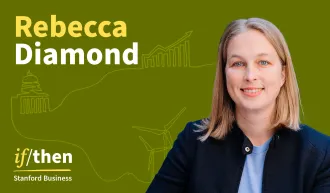
August 14, 2017 Michal Kosinski Shares His Vision of a World without Privacy Should your digital footprint be public?
May 09, 2017 Michal Kosinski: The End of Privacy In part one of a three part series, a Stanford GSB professor discusses a controversial algorithm that knows more about you than your best friend.
October 08, 2015 Will Facebook Replace Traditional Research Methods? Social media offers researchers a window into the human experience.
August 27, 2015 What Our Digital Footprint Says About Us A Stanford scholar says social media reveals your most intimate personality traits.
Psychological Targeting as an Effective Approach to Digital Mass Persuasion S.C. Matz Michal Kosinski G. Nave D. J. Stillwell
- See the Current DEI Report
- Supporting Data
- Research & Insights
- Share Your Thoughts
- Search Fund Primer
- Teaching & Curriculum
- Affiliated Faculty
- Faculty Advisors
- Louis W. Foster Resource Center
- Defining Social Innovation
- Impact Compass
- Global Health Innovation Insights
- Faculty Affiliates
- Student Awards & Certificates
- Changemakers
- Dean Jonathan Levin
- Dean Garth Saloner
- Dean Robert Joss
- Dean Michael Spence
- Dean Robert Jaedicke
- Dean Rene McPherson
- Dean Arjay Miller
- Dean Ernest Arbuckle
- Dean Jacob Hugh Jackson
- Dean Willard Hotchkiss
- Faculty in Memoriam
- Stanford GSB Firsts
- Certificate & Award Recipients
- Dean’s Remarks
- Keynote Address
- Teaching Approach
- Analysis and Measurement of Impact
- The Corporate Entrepreneur: Startup in a Grown-Up Enterprise
- Data-Driven Impact
- Designing Experiments for Impact
- Digital Business Transformation
- The Founder’s Right Hand
- Marketing for Measurable Change
- Product Management
- Public Policy Lab: Financial Challenges Facing US Cities
- Public Policy Lab: Homelessness in California
- Lab Features
- Curricular Integration
- View From The Top
- Formation of New Ventures
- Managing Growing Enterprises
- Startup Garage
- Explore Beyond the Classroom
- Stanford Venture Studio
- Summer Program
- Workshops & Events
- The Five Lenses of Entrepreneurship
- Leadership Labs
- Executive Challenge
- Arbuckle Leadership Fellows Program
- Selection Process
- Training Schedule
- Time Commitment
- Learning Expectations
- Post-Training Opportunities
- Who Should Apply
- Introductory T-Groups
- Leadership for Society Program
- Certificate
- 2023 Awardees
- 2022 Awardees
- 2021 Awardees
- 2020 Awardees
- 2019 Awardees
- 2018 Awardees
- Social Management Immersion Fund
- Stanford Impact Founder Fellowships and Prizes
- Stanford Impact Leader Prizes
- Social Entrepreneurship
- Stanford GSB Impact Fund
- Economic Development
- Energy & Environment
- Stanford GSB Residences
- Environmental Leadership
- Stanford GSB Artwork
- A Closer Look
- California & the Bay Area
- Voices of Stanford GSB
- Business & Beneficial Technology
- Business & Sustainability
- Business & Free Markets
- Business, Government, and Society Forum
- Get Involved
- Second Year
- Global Experiences
- JD/MBA Joint Degree
- MA Education/MBA Joint Degree
- MD/MBA Dual Degree
- MPP/MBA Joint Degree
- MS Computer Science/MBA Joint Degree
- MS Electrical Engineering/MBA Joint Degree
- MS Environment and Resources (E-IPER)/MBA Joint Degree
- Academic Calendar
- Clubs & Activities
- LGBTQ+ Students
- Military Veterans
- Minorities & People of Color
- Partners & Families
- Students with Disabilities
- Student Support
- Residential Life
- Student Voices
- MBA Alumni Voices
- A Week in the Life
- Career Support
- Employment Outcomes
- Cost of Attendance
- Knight-Hennessy Scholars Program
- Yellow Ribbon Program
- BOLD Fellows Fund
- Application Process
- Loan Forgiveness
- Contact the Financial Aid Office
- Evaluation Criteria
- GMAT & GRE
- English Language Proficiency
- Personal Information, Activities & Awards
- Professional Experience
- Letters of Recommendation
- Optional Short Answer Questions
- Application Fee
- Reapplication
- Deferred Enrollment
- Joint & Dual Degrees
- Entering Class Profile
- Event Schedule
- Ambassadors
- New & Noteworthy
- Ask a Question
- See Why Stanford MSx
- Is MSx Right for You?
- MSx Stories
- Leadership Development
- Career Advancement
- Career Change
- How You Will Learn
- Admission Events
- Personal Information
- Information for Recommenders
- GMAT, GRE & EA
- English Proficiency Tests
- After You’re Admitted
- Daycare, Schools & Camps
- U.S. Citizens and Permanent Residents
- Requirements
- Requirements: Behavioral
- Requirements: Quantitative
- Requirements: Macro
- Requirements: Micro
- Annual Evaluations
- Field Examination
- Research Activities
- Research Papers
- Dissertation
- Oral Examination
- Current Students
- Education & CV
- International Applicants
- Statement of Purpose
- Reapplicants
- Application Fee Waiver
- Deadline & Decisions
- Job Market Candidates
- Academic Placements
- Stay in Touch
- Faculty Mentors
- Current Fellows
- Standard Track
- Fellowship & Benefits
- Group Enrollment
- Program Formats
- Developing a Program
- Diversity & Inclusion
- Strategic Transformation
- Program Experience
- Contact Client Services
- Campus Experience
- Live Online Experience
- Silicon Valley & Bay Area
- Digital Credentials
- Faculty Spotlights
- Participant Spotlights
- Eligibility
- International Participants
- Stanford Ignite
- Frequently Asked Questions
- Operations, Information & Technology
- Classical Liberalism
- The Eddie Lunch
- Accounting Summer Camp
- Videos, Code & Data
- California Econometrics Conference
- California Quantitative Marketing PhD Conference
- California School Conference
- China India Insights Conference
- Homo economicus, Evolving
- Political Economics (2023–24)
- Scaling Geologic Storage of CO2 (2023–24)
- A Resilient Pacific: Building Connections, Envisioning Solutions
- Adaptation and Innovation
- Changing Climate
- Civil Society
- Climate Impact Summit
- Climate Science
- Corporate Carbon Disclosures
- Earth’s Seafloor
- Environmental Justice
- Operations and Information Technology
- Organizations
- Sustainability Reporting and Control
- Taking the Pulse of the Planet
- Urban Infrastructure
- Watershed Restoration
- Junior Faculty Workshop on Financial Regulation and Banking
- Ken Singleton Celebration
- Quantitative Marketing PhD Alumni Conference
- Presentations
- Theory and Inference in Accounting Research
- Stanford Closer Look Series
- Quick Guides
- Core Concepts
- Journal Articles
- Glossary of Terms
- Faculty & Staff
- Researchers & Students
- Research Approach
- Charitable Giving
- Financial Health
- Government Services
- Workers & Careers
- Short Course
- Adaptive & Iterative Experimentation
- Incentive Design
- Social Sciences & Behavioral Nudges
- Bandit Experiment Application
- Conferences & Events
- Reading Materials
- Energy Entrepreneurship
- Faculty & Affiliates
- SOLE Report
- Responsible Supply Chains
- Current Study Usage
- Pre-Registration Information
- Participate in a Study
- Founding Donors
- Location Information
- Participant Profile
- Network Membership
- Program Impact
- Collaborators
- Entrepreneur Profiles
- Company Spotlights
- Seed Transformation Network
- Responsibilities
- Current Coaches
- How to Apply
- Meet the Consultants
- Meet the Interns
- Intern Profiles
- Collaborate
- Research Library
- News & Insights
- Program Contacts
- Databases & Datasets
- Research Guides
- Consultations
- Research Workshops
- Career Research
- Research Data Services
- Course Reserves
- Course Research Guides
- Material Loan Periods
- Fines & Other Charges
- Document Delivery
- Interlibrary Loan
- Equipment Checkout
- Print & Scan
- MBA & MSx Students
- PhD Students
- Other Stanford Students
- Faculty Assistants
- Research Assistants
- Stanford GSB Alumni
- Telling Our Story
- Staff Directory
- Site Registration
- Alumni Directory
- Alumni Email
- Privacy Settings & My Profile
- Success Stories
- The Story of Circles
- Support Women’s Circles
- Stanford Women on Boards Initiative
- Alumnae Spotlights
- Insights & Research
- Industry & Professional
- Entrepreneurial Commitment Group
- Recent Alumni
- Half-Century Club
- Fall Reunions
- Spring Reunions
- MBA 25th Reunion
- Half-Century Club Reunion
- Faculty Lectures
- Ernest C. Arbuckle Award
- Alison Elliott Exceptional Achievement Award
- ENCORE Award
- Excellence in Leadership Award
- John W. Gardner Volunteer Leadership Award
- Robert K. Jaedicke Faculty Award
- Jack McDonald Military Service Appreciation Award
- Jerry I. Porras Latino Leadership Award
- Tapestry Award
- Student & Alumni Events
- Executive Recruiters
- Interviewing
- Land the Perfect Job with LinkedIn
- Negotiating
- Elevator Pitch
- Email Best Practices
- Resumes & Cover Letters
- Self-Assessment
- Whitney Birdwell Ball
- Margaret Brooks
- Bryn Panee Burkhart
- Margaret Chan
- Ricki Frankel
- Peter Gandolfo
- Cindy W. Greig
- Natalie Guillen
- Carly Janson
- Sloan Klein
- Sherri Appel Lassila
- Stuart Meyer
- Tanisha Parrish
- Virginia Roberson
- Philippe Taieb
- Michael Takagawa
- Terra Winston
- Johanna Wise
- Debbie Wolter
- Rebecca Zucker
- Complimentary Coaching
- Changing Careers
- Work-Life Integration
- Career Breaks
- Flexible Work
- Encore Careers
- D&B Hoovers
- Data Axle (ReferenceUSA)
- EBSCO Business Source
- Firsthand (Vault)
- Global Newsstream
- Market Share Reporter
- ProQuest One Business
- Student Clubs
- Entrepreneurial Students
- Stanford GSB Trust
- Alumni Community
- How to Volunteer
- Springboard Sessions
- Consulting Projects
- 2020 – 2029
- 2010 – 2019
- 2000 – 2009
- 1990 – 1999
- 1980 – 1989
- 1970 – 1979
- 1960 – 1969
- 1950 – 1959
- 1940 – 1949
- Service Areas
- ACT History
- ACT Awards Celebration
- ACT Governance Structure
- Building Leadership for ACT
- Individual Leadership Positions
- Leadership Role Overview
- Purpose of the ACT Management Board
- Contact ACT
- Business & Nonprofit Communities
- Reunion Volunteers
- Ways to Give
- Fiscal Year Report
- Business School Fund Leadership Council
- Planned Giving Options
- Planned Giving Benefits
- Planned Gifts and Reunions
- Legacy Partners
- Giving News & Stories
- Giving Deadlines
- Development Staff
- Submit Class Notes
- Class Secretaries
- Board of Directors
- Health Care
- Sustainability
- Class Takeaways
- All Else Equal: Making Better Decisions
- If/Then: Business, Leadership, Society
- Grit & Growth
- Think Fast, Talk Smart
- Spring 2022
- Spring 2021
- Autumn 2020
- Summer 2020
- Winter 2020
- In the Media
- For Journalists
- DCI Fellows
- Other Auditors
- Academic Calendar & Deadlines
- Course Materials
- Entrepreneurial Resources
- Campus Drive Grove
- Campus Drive Lawn
- CEMEX Auditorium
- King Community Court
- Seawell Family Boardroom
- Stanford GSB Bowl
- Stanford Investors Common
- Town Square
- Vidalakis Courtyard
- Vidalakis Dining Hall
- Catering Services
- Policies & Guidelines
- Reservations
- Contact Faculty Recruiting
- Lecturer Positions
- Postdoctoral Positions
- Accommodations
- CMC-Managed Interviews
- Recruiter-Managed Interviews
- Virtual Interviews
- Campus & Virtual
- Search for Candidates
- Think Globally
- Recruiting Calendar
- Recruiting Policies
- Full-Time Employment
- Summer Employment
- Entrepreneurial Summer Program
- Global Management Immersion Experience
- Social-Purpose Summer Internships
- Process Overview
- Project Types
- Client Eligibility Criteria
- Client Screening
- ACT Leadership
- Social Innovation & Nonprofit Management Resources
- Develop Your Organization’s Talent
- Centers & Initiatives
- Student Fellowships
Facebook’s Cambridge Analytica Controversy Could Be Big Trouble for the Social Network. Here’s What to Know
T he fallout from Facebook’s data scandal involving Cambridge Analytica continues this week, as more information came to light confirming that at least 87 million Facebook users were impacted by hidden data harvesting — an update from the “ tens of millions ” figure that Facebook previously said were touched by its ongoing privacy crisis.
Facebook, which is the largest social media company in the world, admitted today that the number was much higher than previously believed at the bottom of a blog post written by Chief Technology Officer Mike Schroepfer.
“In total, we believe the Facebook information of up to 87 million people — mostly in the US — may have been improperly shared with Cambridge Analytica,” he wrote.
He laid out nine ways Facebook is now working on to better protect user information , saying that the changes will limit the ways apps are allowed to collect and share people’s information.
Third party apps will now be restricted from accessing certain kinds of user information they could previously collect from Facebook features like Events, Groups and Pages. Other changes include updates to the ways third-party apps can collect data related to logins for things like “check-ins, likes, photos, posts, videos, events and groups,” the company’s statement reads.
It also says that apps will no longer be allowed to collect personal data such as “religious or political views, relationship status and details, custom friends lists, education and work history, fitness activity, book reading activity, music listening activity, news reading, video watch activity, and games activity.”
The social media juggernaut also announced that it has disabled certain features in “search and account recovery” to prevent people’s public profiles from being scraped by “malicious actors.” It is also completely shutting down its Partner Categories, which is “a product that lets third-party data providers offer their targeting directly on Facebook,” the statement says.
A new feature is also being added to everyone’s newsfeed — a link at the top of the page that will allow users to see what information apps they use have collected about them, and also allow users to remove those apps if they choose. Facebook pledged to alert those users whose personal data was improperly collected by Cambridge Analytica.
Facebook also posted a link to updated policies for Instagram , which it owns.
While the users affected are mainly in the U.S., the BBC has also reported that about one million of the 87 million users impacted are based in the U.K.
Facebook’s announcement that almost 90 million users were affected comes on the heels of the news that CEO Mark Zuckerberg will testify before Congress on April 11.
The drama began when the $500 billion company admitted earlier in March that data analysis firm Cambridge Analytica, which has close ties to President Trump’s election campaign and right-leaning megadonors, used data that had been collected from millions of users without their consent. Facebook has since suspended Cambridge Analytica’s access to its platform.
Facebook continues to take a beating from commentators and investors alike as its stock keeps plunging — the company’s market cap dropped $50 billion alone during first week that the scandal came to light, becoming its largest ever two-day drop . Meanwhile, lawmakers in the U.S. and the U.K. who demanded Zuckerberg explain his company’s practices may finally get some answers during his testimony next week.
Here’s what to know about Facebook’s latest crisis.
What is Cambridge Analytica?
Cambridge Analytica is a political analysis firm that claims to build psychological profiles of voters to help its clients win elections. The company is accused of buying millions of Americans’ data from a researcher who told Facebook he was collecting it strictly for academic purposes. Facebook allowed Aleksandr Kogan, a psychology professor at the University of Cambridge who owns a company called Global Science Research, to harvest data from users who downloaded his app. The problem was that Facebook users who agreed to give their information to Kogan’s app also gave up permission to harvest data on all their Facebook friends, as well, according to the Guardian.
The breach occurred when Kogan then sold this data to Cambridge Analytica, which is against Facebook’s rules. Facebook says it has since changed the way it allows researchers to collect data from the platform as a result.
Christopher Wylie, a whistleblower who worked at Cambridge Analytica before quitting in 2014, claimed on NBC’s Today Show Monday morning that the firm was “founded on misappropriated data of at least 50 million Facebook users.”
Wylie added that Cambridge Analytica’s goal was to establish profiling algorithms that would “allow us to explore mental vulnerabilities of people, and then map out ways to inject information into different streams or channels of content online so that people started to see things all over the place that may or may not have been true.”
The data firm initially told British Parliament it did not collect people’s information without their content during a hearing in February, but later admitted in a statement to the New York Times that they did in fact obtain the data, though the company claims to have deleted the information as soon as it found out it violated Facebook’s privacy rules.
Cambridge Analytica issued a number of press releases in the days following the explosive media reports, saying that it “strongly denies the claims” it acted improperly.
“In 2014 we received Facebook data and derivatives of Facebook data from another company, GSR, that we engaged in good faith to legally supply data for research,” the statement reads. “After it subsequently became known that GSR had broken its contract with Cambridge Analytica because it had not adhered to data protection regulation, Cambridge Analytica deleted all the Facebook data and derivatives, in cooperation with Facebook… This Facebook data was not used by Cambridge Analytica as part of the services it provided to the Donald Trump presidential campaign.”
Facebook also issued a statement on its website Monday saying that the claim there was a data breach is “completely false” and Facebook users “gave their consent” when they signed up for certain kinds of apps, like the one Kogan exploited for data collection purposes. The social media juggernaut also maintained that “no systems were infiltrated, and no passwords or sensitive pieces of information were stolen or hacked.”
Who is the Cambridge Analytica whistleblower?
Christopher Wylie, a former employee of Cambridge Analytica, spoke out about the firm’s practices on the Today Show Monday morning after previously giving an interview to the New York Times. Wylie, who quit the company in 2014, said he believes it’s important for Americans to know what companies are doing with their personal information, as well as whether Cambridge Analytica’s practices influenced the democratic process.
“This was a company [Cambridge Analytica] that really took fake news to the next level by powering it with algorithms,” he said in an interview on the Today Show Monday morning.
Watch @savannahguthrie 's full interview with Cambridge Analytica whistleblower Christopher Wylie pic.twitter.com/NMbHoOkDWA — TODAY (@TODAYshow) March 19, 2018
Wylie also claimed that Cambridge Analytica has been in talks with Russian oil companies and employs a psychologist who works on Russia-funded projects. Any ties between Cambridge and Russia could complicate matters for Facebook, which has spent the past several months grappling with accusations that Moscow used it and other social media networks to meddle in the 2016 U.S. elections.
In a statement, Cambridge Analytica said Wylie left the company to found a rival firm.
“Their source is a former contractor for Cambridge Analytica – not a founder as has been claimed – who left in 2014 and is misrepresenting himself and the company throughout his comments,” the company said.
What is Cambridge Analytica’s connection to Steve Bannon?
Onetime Trump campaign advisor and Former White House Chief Strategist Steve Bannon was previously vice president of Cambridge Analytica’s board, according to the New York Times. Wylie told the Guardian that Bannon was his boss at Cambridge Analytica. Bannon has been involved in propping up right-wing political groups for years, having been the executive chairman and co-founder of Breitbart News, a far right-wing digital publication, until he stepped down from the position in January.
Additionally, Republican megadonor and onetime Breitbart News CEO Robert Mercer , who has funded numerous conservative campaigns at every level of government, invested $15 million in Cambridge Analytica. His daughter, Rebekah Mercer was also a board member of the political data firm. The Mercers originally supported Ted Cruz’ presidential campaign, but became patrons of the Trump campaign after Cruz bowed out of the 2016 presidential race.
The Times reported that through their family foundation the Mercer’s have donated more than $100 million to conservative causes — $10 million of which went to Breitbart News, and another $6 million that went to the Government Accountability Institute, a nonprofit founded by Bannon.
What does Mark Zuckerberg say?
Facebook executives responded to the crisis on Wednesday by issuing statements on the social media platform.
Zuckerberg admitted that Facebook made mistakes and acknowledged that his company failed to responsibly protect the data of customers.
He gave a timeline explaining how the improper data harvesting occurred, and said that in 2014 the company changed its practices to limit the ability of “abusive apps” to collect data from users and their other Facebook friends who did not give consent.
“In 2007, we launched the Facebook Platform with the vision that more apps should be social…To do this, we enabled people to log into apps and share who their friends were and some information about them….In 2013, a Cambridge University researcher named Aleksandr Kogan created a personality quiz app. It was installed by around 300,000 people who shared their data as well as some of their friends’ data. Given the way our platform worked at the time this meant Kogan was able to access tens of millions of their friends’ data.”
Zuckerberg also acknowledged that journalists informed Facebook as early as 2015 that Kogan shared this data with Cambridge Analytica, and said the company subsequently banned Kogan’s apps from the social network because they violated Facebook policies.
“This was a breach of trust between Kogan, Cambridge Analytica and Facebook. But it was also a breach of trust between Facebook and the people who share their data with us and expect us to protect it. We need to fix that,” he wrote on Facebook.
He also said the company will investigate all apps that had “access to large amount of information” before the 2014 policy changes, and that Facebook plans to further restrict developers’ access to Facebook users’ data moving forward. The company will also make it easier for users to deny permission to third party developers that collect their personal information. As part of this effort, the company plans to move its privacy tool to the top of the News Feed.
Facebook’s Chief Operating Officer Sheryl Sandberg shared Zuckerberg’s post on her own Facebook page , saying she “deeply regrets” that the company did not do more to address the problem. Facebook will also start to ban developers who misuse “personally identifiable information” and alert users when Facebook learns their data has been misused, she wrote.

More Must-Reads From TIME
- Jane Fonda Champions Climate Action for Every Generation
- Biden’s Campaign Is In Trouble. Will the Turnaround Plan Work?
- Why We're Spending So Much Money Now
- The Financial Influencers Women Actually Want to Listen To
- Breaker Sunny Choi Is Heading to Paris
- Why TV Can’t Stop Making Silly Shows About Lady Journalists
- The Case for Wearing Shoes in the House
- Want Weekly Recs on What to Watch, Read, and More? Sign Up for Worth Your Time
Contact us at [email protected]
You May Also Like
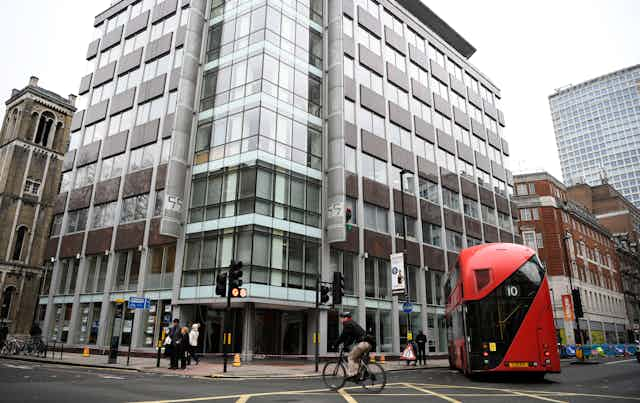
Cambridge Analytica and SCL – how I peered inside the propaganda machine
Senior Lecturer in Journalism, University of Essex
Disclosure statement
Dr Emma L Briant receives funding from ESRC Studentship
University of Essex provides funding as a member of The Conversation UK.
View all partners
British electoral consultancy firm Cambridge Analytica and its parent company, SCL Group, continue to be dogged by a series of allegations, weeks after a whistle blower told The Observer that data had been harvested from Facebook by an academic research company called Global Science Research, which then licensed SCL to use the data.
As an expert in propaganda, I conducted interviews with key figures at SCL, Cambridge Analytica and Leave.EU for research projects on the Trump and Brexit campaigns long before the data scandal was made public.
It has been claimed that Cambridge Analytica was involved in the Brexit campaign and that the firm allegedly used unethical methods to help sway international elections .
Cambridge Analytica and SCL have denied any wrongdoing. Leave.EU says Cambridge Analytica “has never carried out any work on behalf of Leave.EU”.
However, the data scandal continues to engulf the firm. The Conservative MP, Damian Collins, who is the chair of the cross-party Digital, Culture, Media and Sport Committee currently scrutinising “fake news”, has said that the story – which led to Facebook boss, Mark Zuckerberg, recently being grilled by US lawmakers – is “only in the foothills” and is a broader global issue.
Read more: Facebook's data lockdown is a disaster for academic researchers
Due to my expertise, I was recently asked by the UK’s Electoral Commission , the Information Commissioner’s Office and the Digital, Culture, Media and Sport Committee to submit evidence relating to electoral campaigns by Cambridge Analytica, SCL and others who were involved in the campaigns.
I researched SCL’s war on terror work for my book on propaganda and counter-terrorism, for which I conducted numerous in-depth interviews. Over the years I was able to build up enough contacts to place me in a rare position to gain access to interviews on the 2016 US election for another new book about media bias and the rise of Trump, co-authored with professor Robert M Entman of the George Washington University. I have also been working on research and publications about the EU referendum.
I was alarmed by what my research uncovered, and it was both a matter of personal conscience and public responsibility as an academic to provide information to the various inquiries and investigations that are now underway.
Statements from my research – which includes interviews with staff at Cambridge Analytica and SCL personnel, and documents they gave me, alongside essays contextualising and discussing what I found – have now been published by the fake news inquiry .
My evidence also includes transcripts from my interviews with representatives at SCL, Cambridge Analytica and Leave.EU.
Dark arts and cream teas
For more than a decade, I’ve conducted interviews with government personnel and key contractors, including SCL, working in a very secretive area as part of my research on UK and US propaganda during conflicts . I gained access slowly at first, gradually winning confidence through introductions once I had a few contacts in this tight-knit and suspicious field.
In my 2015 book , I explored how a romanticised British military reputation that strives to win over the “hearts and minds” of the public overlays a mythologised notoriety for the “dark arts” of information warfare. This myth helped Britain to extend a perception of expertise and inflate its importance among Americans during the “war on terror” conflicts. The so-called “special relationship” between the two countries and perceptions of “British expertise” in propaganda aided me in gaining access to research interviews in the US.
I’ve observed that this niche perception of British expertise in the dark arts can prove helpful for former military contractors when promoting their work in the US. SCL and Cambridge Analytica appear to have similarly extended their reach in politics by using US perceptions of “Britishness”. By way of example, Cambridge Analytica’s former research director, Chris Wylie – who was first to blow the whistle on the company – claimed it had fabricated ties to the University of Cambridge.
Cambridge Analytica, headquartered in London, was set up in 2013 and is a closely affiliated subsidiary of SCL.
My evidence and recent coverage from Channel 4 News show how the ex-Cambridge Analytica CEO, Alexander Nix, would push his firm’s supposed notoriety in the dark arts in brazen ways – such as the invasive psychological profiling of US citizens during the Trump campaign – while a public image of SCL projected its apparent moral compliance and respect for democracy.
The top executives – such as SCL boss Nigel Oakes – could be charming in interviews, as I recently explained on BBC Radio 4 . For Oakes, the activities we discussed seemed normal. Oakes told me he saw Nix as “the guy who wants to sell the flashy box”.
In another exchange published by parliament, he said : “Alexander Nix has one downside, which I don’t agree with. This is very much off the record, he believes that all press is good press.” Oakes told me that Nix understood the importance of keeping Cambridge Analytica’s name in the news to help bring in more business, even if the company was generating critical coverage.
He added: “… frequently people come to us and say ‘we’ve got so many dirty tricks against us, we now need to know the dirty tricks to go back’. Or ‘we need to know how to counter the dirty tricks and you guys seem to know how to do it’.”
My discussions with interviewees on the topic of unethical conduct emerged cautiously, but with a knowing smile, over casual cream teas in a London shopping centre. All this with my recording device on the table.
I earned my interviewees’ trust by being open about the purpose of my research and asking the right questions, sometimes very directly, in a way that made them feel comfortable. I told interviewees connected with Leave.EU that I had voted for Britain to remain in the European Union, because honesty helps to build trust.
Read more: Cambridge Analytica scandal: legitimate researchers using Facebook data could be collateral damage
Andy Wigmore, who is the former communications director of Leave.EU – which failed to become the officially designated campaign for British voters who wanted to exit the European Union – told me that the group had copied strategies shared with Leave.EU by Cambridge Analytica. But Leave.EU didn’t go on to hire Cambridge Analytica.
He also said that whipping up concerns among voters about immigration was “the main thrust” of Leave.EU’s campaign during the Brexit referendum.
At one point, Wigmore also spoke in admiring terms about Nazi propaganda techniques. He told me :
The propaganda machine of the Nazis, for instance – you take away all the hideous horror and that kind of stuff – it was very clever, the way they managed to do what they did. In its pure marketing sense, you can see the logic of what they were saying, why they were saying it, and how they presented things, and the imagery.
Oakes also talked to me about Nazi Germany, by claiming that Adolf Hitler “didn’t have a problem with the Jews at all, but the people didn’t like the Jews”. He said Hitler used Jewish people to “leverage an artificial enemy. Well, that’s exactly what Trump did. He leveraged a Muslim.”
Wigmore now claims that his interview with me was “not for publication” and described the release of evidence to parliament as “willful deception and trickery”. In fact, the entire exchange was on the record and Wigmore’s willingness to contribute to the research is recorded on tape several times.
It takes a calm, friendly, diligent approach for a researcher to gather this much illuminating material. A ton of patience and time is also required to move beyond evasiveness and gain access to closed elite networks. As a sociologist, I learned how to navigate Cambridge Analytica and SCL’s subculture and used similar language to build an understanding of how the modern day “propaganda machine” works.
This article has been amended to specify that data had been harvested from Facebook by Global Science Research, not Cambridge Analytica as previously stated.
- Information warfare
- Cambridge Analytica
- Data scandal

Lecturer (Hindi-Urdu)

Initiative Tech Lead, Digital Products COE

Director, Defence and Security

Opportunities with the new CIEHF

School of Social Sciences – Public Policy and International Relations opportunities
- Share full article
Advertisement
Supported by
Facebook and Cambridge Analytica: What You Need to Know as Fallout Widens
By Kevin Granville
- March 19, 2018

Our report that a political firm hired by the Trump campaign acquired access to private data on millions of Facebook users has sparked new questions about how the social media giant protects user information.
Who collected all that data?
Cambridge Analytica, a political data firm hired by President Trump’s 2016 election campaign, gained access to private information on more than 50 million Facebook users. The firm offered tools that could identify the personalities of American voters and influence their behavior.
Cambridge has been largely funded by Robert Mercer, the wealthy Republican donor, and Stephen K. Bannon, a former adviser to the president who became an early board member and gave the firm its name. It has pitched its services to potential clients ranging from Mastercard and the New York Yankees to the Joint Chiefs of Staff.
On Monday, a British TV news report cast it in a harsher light, showing video of Cambridge Analytica executives offering to entrap politicians. A day later, as a furor grew, the company suspended its chief executive, Alexander Nix.
[Read more about how Cambridge Analytica and the Trump campaign became linked]
What kind of information was collected, and how was it acquired?
The data, a portion of which was viewed by The New York Times, included details on users’ identities, friend networks and “likes.” The idea was to map personality traits based on what people had liked on Facebook, and then use that information to target audiences with digital ads.
Researchers in 2014 asked users to take a personality survey and download an app, which scraped some private information from their profiles and those of their friends, activity that Facebook permitted at the time and has since banned.
The technique had been developed at Cambridge University’s Psychometrics Center. The center declined to work with Cambridge Analytica, but Aleksandr Kogan, a Russian-American psychology professor at the university, was willing.
Dr. Kogan built his own app and in June 2014 began harvesting data for Cambridge Analytica.
He ultimately provided over 50 million raw profiles to the firm, said Christopher Wylie, a data expert who oversaw Cambridge Analytica’s data harvesting. Only about 270,000 users — those who participated in the survey — had consented to having their data harvested, though they were all told that it was being used for academic use.
Facebook said no passwords or “sensitive pieces of information” had been taken, though information about a user’s location was available to Cambridge.
[Read more about the internal tension at the top of Facebook over the platform’s political exploitation]
So was Facebook hacked?
Facebook in recent days has insisted that what Cambridge did was not a data breach , because it routinely allows researchers to have access to user data for academic purposes — and users consent to this access when they create a Facebook account.
But Facebook prohibits this kind of data to be sold or transferred “to any ad network, data broker or other advertising or monetization-related service.” It says that was exactly what Dr. Kogan did, in providing the information to a political consulting firm.
Dr. Kogan declined to provide The Times with details of what had happened, citing nondisclosure agreements with Facebook and Cambridge Analytica.
Cambridge Analytica officials, after denying that they had obtained or used Facebook data, changed their story last week. In a statement to The Times, the company acknowledged that it had acquired the data, though it blamed Dr. Kogan for violating Facebook’s rules and said it had deleted the information as soon as it learned of the problem two years ago.
But the data, or at least copies, may still exist. The Times was recently able to view a set of raw data from the profiles Cambridge Analytica obtained.
What is Facebook doing in response?
The company issued a statement on Friday saying that in 2015, when it learned that Dr. Kogan’s research had been turned over to Cambridge Analytica, violating its terms of service, it removed Dr. Kogan’s app from the site. It said it had demanded and received certification that the data had been destroyed.
Facebook also said: “Several days ago, we received reports that, contrary to the certifications we were given, not all data was deleted. We are moving aggressively to determine the accuracy of these claims. If true, this is another unacceptable violation of trust and the commitments they made. We are suspending SCL/Cambridge Analytica, Wylie and Kogan from Facebook, pending further information.”
In a further step, Facebook said Monday that it had hired a digital forensics firm “to determine the accuracy of the claims that the Facebook data in question still exists.” It said that Cambridge Analytica had agreed to the review and that Dr. Kogan had given a verbal commitment, while Mr. Wylie “thus far has declined.”
[Read more about how to protect your data on Facebook]
What are others saying?
Facebook, already facing deep questions over the use of its platform by those seeking to spread Russian propaganda and fake news, is facing a renewed backlash after the news about Cambridge Analytica. Investors have not been pleased, sending shares of the company down more than 8 percent since Friday.
■The Federal Trade Commission said Tuesday it is investigating whether Facebook violated a 2011 consent agreement to keep users’ data private.
■ In Congress, Senators Amy Klobuchar, a Democrat from Minnesota, and John Kennedy, a Republican from Louisiana, have asked to hold a hearing on Facebook’s links to Cambridge Analytica. Republican leaders of the Senate Commerce Committee, led by John Thune of South Dakota, wrote a letter on Monday to Mark Zuckerberg, Facebook’s chief executive, demanding answers to questions about how the data was collected.
■ A British Parliament committee sent a letter to Mr. Zuckerberg asking him to appear before the panel to answer questions on Facebook’s ties to Cambridge Analytica.
■ The attorney general of Massachusetts, Maura Healey, announced on Saturday that her office was opening an investigation. “Massachusetts residents deserve answers immediately from Facebook and Cambridge Analytica,” she said in a Twitter post . Facebook’s lack of disclosure on the harvesting of data could violate privacy laws in Britain and several states.
A Guide to Digital Safety
A few simple changes can go a long way toward protecting yourself and your information online..
A data breach into your health information can leave you feeling helpless. But there are steps you can take to limit the potential harm.
Don’t know where to start? These easy-to-follow tips and best practices will keep you safe with minimal effort.
Your email address has become a digital bread crumb that companies can use to link your activity across sites. Here’s how you can limit this .
Protect your most sensitive accounts by creating unique passwords and adding extra layers of verification .
There are stronger methods of two-factor authentication than text messages. Here are the pros and cons of each .
Do you store photos, videos and important documents in the cloud? Make sure you keep a copy of what you hold most dear .
Browser extensions are free add-ons that you can use to slow down or stop data collection. Here are a few to try.
Thank you for visiting nature.com. You are using a browser version with limited support for CSS. To obtain the best experience, we recommend you use a more up to date browser (or turn off compatibility mode in Internet Explorer). In the meantime, to ensure continued support, we are displaying the site without styles and JavaScript.
- View all journals
- Explore content
- About the journal
- Publish with us
- Sign up for alerts
- 27 March 2018
Cambridge Analytica controversy must spur researchers to update data ethics
You have full access to this article via your institution.

Misuse of information from Facebook users will trigger much-needed updates to data ethics. Credit: Josh Edelson/AFP/Getty
Revelations keep emerging in the Cambridge Analytica personal-data scandal, which has captured global public attention for more than a week. But when the dust settles, researchers harvesting data online will face greater scrutiny. And so they should.
At the centre of the controversy is Aleksandr Kogan, a psychologist and neuroscientist at the University of Cambridge, UK. In 2014, he recruited people to complete a number of surveys and sign up to an app that handed over Facebook information on themselves — and tens of millions of Facebook friends. Kogan passed the data to SCL, a UK firm that later founded controversial political-consultancy firm Cambridge Analytica in London. (All those involved deny any wrongdoing.)
Last week, Facebook announced restrictions on data harvesting by third parties, including drastically reducing the kinds of information that app developers can access. (It had already changed its rules in 2014 to stop developers gleaning data from users’ friends through their apps.) But damage has been done: the public has good reason to be angry about the way in which researchers and companies have seemingly used personal data without consumers’ full understanding or consent.
Where do academic researchers fit in? Handled correctly, online data can be a major boon to research, and the world would benefit from companies such as Facebook making their data more open. Ethical safeguards for research that intervenes in human lives were largely set up for medical and psychological studies, and are often written with definitions that exclude Internet research. In the United States, for example, unless data collected are both private and identifiable, informed consent is usually not deemed necessary, and research requires minimal, if any, oversight by an institutional review board. This would include data from Twitter, which are by default public. Models built on anonymized Facebook data would also tend to be exempt.
Kogan’s study was unusual, both in that it was done by a university academic for a private company he operated, and in that the data were passed to a third party. Yet there is a common theme behind this controversy and ones that preceded it — such as a study warning that someone’s sexual orientation could be determined from their online presence ( Y. Wang and M. Kosinski J. Personality Soc. Psychol . 114, 246–257; 2018 ). Data were used in ways well beyond what users expected or intended. Bundled together and trawled by algorithms, innocuous data points can reveal information that users might reasonably expect to stay private and that might be used in ways they are not happy with.
Guidance does exist. A number of projects are grappling with the ethical challenges of big data. US and European funders have supported efforts in this area, and have issued recommendations such as rethinking what counts as ‘public’ data and the need to consider a study’s potential harm to society, as well as to individuals. (The University of Cambridge is among the institutions writing guidelines for Internet-mediated research, after the UK Research Integrity Office issued non-binding recommendations on the topic in 2016.) Funders should further support such efforts, and make them better known to researchers.
Sticking points remain, a major one being that consent is often not practical when retrospectively accessing data from millions of individuals. But as outlined for biomedical scientists in the 1978 Belmont Report, the principle of beneficence applies: researchers should put the good of research participants first and, with that in mind, perform their own assessment of risks versus benefits. Studies should not be done just because the data are there. In studies that are too large to ask participants for consent, researchers should poll the views of samples of subjects and of any population that could be affected by the outcomes. Ethics training on research should be extended to computer scientists who have not conventionally worked with human study participants.
Academics across many fields know well how technology can outpace its regulation. All researchers have a duty to consider the ethics of their work beyond the strict limits of law or today’s regulations. If they don’t, they will face serious and continued loss of public trust.
Nature 555 , 559-560 (2018)
doi: https://doi.org/10.1038/d41586-018-03856-4
Reprints and permissions
Related Articles

- Research management

A guide to the Nature Index
Nature Index 13 MAR 24

Decoding chromatin states by proteomic profiling of nucleosome readers
Article 06 MAR 24

‘All of Us’ genetics chart stirs unease over controversial depiction of race
News 23 FEB 24

How papers with doctored images can affect scientific reviews
News 28 MAR 24
Superconductivity case shows the need for zero tolerance of toxic lab culture
Correspondence 26 MAR 24
Meaningfulness in a scientific career is about more than tangible outputs
Correspondence 19 MAR 24
Adopt universal standards for study adaptation to boost health, education and social-science research
Correspondence 02 APR 24
How can we make PhD training fit for the modern world? Broaden its philosophical foundations
Allow researchers with caring responsibilities ‘promotion pauses’ to make research more equitable
Head of ClinicalTrials.gov
National Institutes of Health (NIH) National Library of Medicine (NLM) National Center for Biotechnology Information (NCBI) Information Engineering...
Washington D.C. (US)
National Library of Medicine, National Center for Biotechnology Information
POSTDOCTORAL FELLOWSHIP IN SYSTEMS BIOLOGY: PRECISION VACCINE PROGRAM (PVP) - BOSTON CHILDREN'
The Data Management and Analysis Core (DMAC) within the Precision Vaccine Program (PVP) at Boston Children’s Hospital and Harvard Medical School (H...
Boston, Massachusetts
Boston Children's Hospital - Department of Pediatrics
2024 Recruitment notice Shenzhen Institute of Synthetic Biology: Shenzhen, China
The wide-ranging expertise drawing from technical, engineering or science professions...
Shenzhen,China
Shenzhen Institute of Synthetic Biology
Global Talent Recruitment (Scientist Positions)
Global Talent Gathering for Innovation, Changping Laboratory Recruiting Overseas High-Level Talents.
Beijing, China
Changping Laboratory
Senior Scientist, Research
Be part of something altogether life-changing! Working at Cytiva means being at the forefront of providing new solutions to transform human heal...
Vancouver, British Columbia (CA)
Sign up for the Nature Briefing newsletter — what matters in science, free to your inbox daily.
Quick links
- Explore articles by subject
- Guide to authors
- Editorial policies
Tinggalkan Balasan Batalkan balasan
Alamat email Anda tidak akan dipublikasikan. Ruas yang wajib ditandai *
Customer Reviews

Customer Reviews

Service Is a Study Guide
Our cheap essay writing service aims to help you achieve your desired academic excellence. We know the road to straight A's isn't always smooth, so contact us whenever you feel challenged by any kind of task and have an original assignment done according to your requirements.


Pulling together: how Cambridge came to dominate the Boat Race – a photo essay
The race along the River Thames between England’s two greatest universities spans 195 years of rivalry and is now one of the world’s oldest and most famous amateur sporting events. Our photographer has been spending time with the Cambridge University Boat Club over the past few months as they prepare for 2024’s races
T he idea of a Boat Race between the two universities dates back to 1829, sparked into life by a conversation between Old Harrovian schoolfriends Charles Merivale, a student at the time at St John’s College Cambridge, and Charles Wordsworth who was at Christ Church Oxford. On 12 March that year, following a meeting of the newly formed Cambridge University Boat Club, a letter was sent to Oxford.
The University of Cambridge hereby challenge the University of Oxford to row a match at or near London each in an eight-oar boat during the Easter vacation.
From then, the Cambridge University Boat Club has existed to win just one race against just one opponent, something Cambridge has got very good at recently. Last year the Light Blues won every race: the open-weight men’s and women’s races, both reserve races, plus both lightweight races – six victories, no losses, an unprecedented clean sweep. Cambridge women’s open-weight boat, or blue boat, has won the last six Boat Races while the men’s equivalent have won five out of the last seven. In such an unpredictable race, where external factors can play a large part, this dominance is startling.

Thames trials
Rough water as the two women’s boats make their way along the River Thames near Putney Embankment during the Cambridge University Boat Race trials.
It’s a mid-December day by the River Thames. The sky and water merge together in a uniform battleship grey and the bitter north wind whips the tops off the waves. Outside a Putney boathouse two groups of tense-looking women dressed in duck-egg blue tops and black leggings with festive antlers in their hair are huddling together, perhaps for warmth, maybe for solidarity. The odd nervous bout of laughter breaks out. For some of them this is about to be their first experience of rowing on the Tideway, a baptism of fire on the famous stretch of London water where the Boat Race takes place. “Perfect conditions,” remarks Paddy Ryan, the head coach for Cambridge University women, for this is trial eights day, when friends in different boats duel for coveted spots in the top boat.
A couple of hours later these women along with their male equivalents will have pushed themselves to the absolute limit, so much so that several of the men are seen trying to throw up over the side of their boats at the finish under Chiswick Bridge. This may be brutal but it’s just the start. For these students the next few months are going to be incredibly tough, balancing academic work with training like a professional athlete. Through the harshest months of the year they will be focused on preparing for the end of March and a very simple goal: beating Oxford in the Boat Race.

Agony for one of the men’s boats after the finish of the race near Chiswick Bridge during the Cambridge University Boat Race trials.

Ely early mornings
Two of the women’s boats head out in the early morning for a training session on the Great Ouse.
Early winter mornings on the banks of the Great Ouse, well before the sun has risen, can be pretty bleak. In the pitch black a batch of light blue minivans drop off the men and women rowers together at the sleek Ely boathouse that was opened in 2016 at the cost of £4.9m – it’s here that all Cambridge’s on-water training takes place. Very soon a fleet of boats carrying all the teams takes to the water for a training session that may last a couple of hours. Then it’s a quick change, a lift to the train station and back to Cambridge for morning lectures.

The women’s squad head into the Ely boathouse after a 6am drop-off.
As a rower descends the stairs to the bays where the boats are stored, there is a clear indication of why it was built and why they are there. “This is where we prepare to win Boat Races,” a sign says. Since this boathouse was built, Cambridge have won 30 of the 37 races across all categories.

Top: The men’s squad stretch in the boathouse before an early morning training session and a member of the men’s blue boat descends the stairs into where the boats are kept. Below: One of the men’s teams set off for early morning training and the women’s blue boat rows past the women’s lightweight crew during a training session.
It’s a far cry from the old tin sheds with barely any heating and no showers. These current facilities are impressive, enabling the entire men’s and women’s squads to be there at the same time and get boats out.

Top: The men’s blue boat prepare to derig their boat at their Ely training site. Above: The women’s blue boat put their vessel back in the boathouse after a training session on the Great Ouse.
But it’s not just the boathouse that has contributed so much, it’s also the stretch of water they train on. In a year when floods have affected so many parts of the country it has really come into its own. Paddy Ryan, the chief women’s coach, explains: “Along this stretch the river is actually higher than the surrounding land. The water levels are carefully managed by dikes and pumps. As a result we haven’t lost a single session to flooding. That’s not the case for Oxford. I believe their boathouse has been flooded multiple times this year, unable to get to their boats. We’ve had multiple storms but we’ve been able to row through them all.”

The men’s third boat practises on the Great Ouse.
It’s a flat, unforgiving landscape, especially in midwinter, definitely not the prettiest stretch of water, but Cambridge don’t care. Ryan says: “It might be a little dull on the viewing perspective but we could row on for 27km before needing to turn round. We have a 5km stretch that is marked out every 250m. We are lucky to have it.”
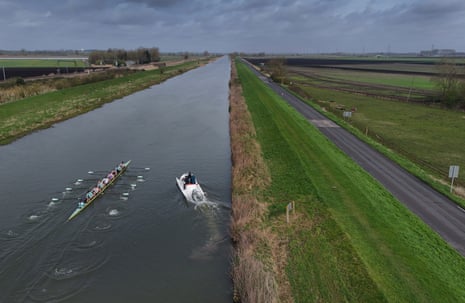
The men’s blue boat practise their starts on the long straight on the Great Ouse.

The sweat box
Members of the men’s squad check on their technique with the use of a mirror at the Goldie boathouse.
The old-fashioned Goldie boathouse is right in the centre of Cambridge perched on the banks of the River Cam. Built in 1873, its delicate exterior belies what goes on inside. This is the boat club’s pain cave, where the rowers sweat buckets, pushing themselves over and over again; it’s a good job the floor is rubberised and easy to wipe clean.

A wreath to Charles Merivale, the founder of the Boat Race, and wood panelling in the upstairs room at the Goldie boathouse which commemorates Cambridge crews that have competed in the Boat Race from 1829.

(Top) Seb Benzecry, men’s president of the Cambridge University Boat Club, and (above) Martin Amethier, a member of the reserve Goldie crew, sweat during sessions on ergo machines.

Iris Powell of the women’s blue boat (above) performs pull-ups during a training session.

Above left: Hannah Murphy, the cox of the women’s blue boat, urges on four of her crew (left to right) Gemma King, Megan Lee, Jenna Armstrong and Clare Hole, as they undertake a long session on the ergo machines. Above right: Kenny Coplan, a member of the men’s blue boat crew, looks exhausted then writes in his times after his session on an ergo machine (below).
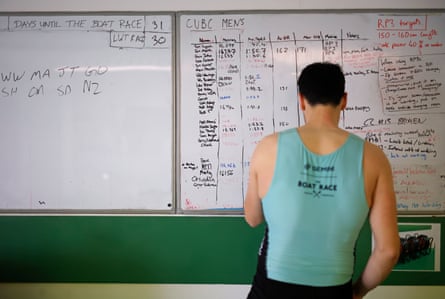
Brutal sessions on the various ergo machines, where thousands of metres are clocked and recorded, are a staple of the training regime set in place. If there is any slacking off the students just need to look up at one of the walls where a map of the Boat Race course hangs. The “S” shape of the Thames has been carefully coloured in the correct shade of blue and record timings for various key points on the course have been written in for both men and women. All but one record, and that one is shared, is held by Cambridge.

Paddy Ryan, the women’s chief coach, talks to the women’s blue boat during a training session on the River Great Ouse in February.
A key ingredient in any successful team is the coaching. Cambridge’s setup is stable and well established. Paddy Ryan is the chief women’s coach, a genial, tall Australian, he has been part of the women’s coaching team since 2013. The care and devotion to his squad is perfectly clear. “I have my notebook next to my bed so I can jot things down. I wake up in the middle of the night going: am I making the right decisions? I care about them as people and I need to manage them … We joke as coaches that we are teaching some of the smartest people on the planet how to pull on a stick.”
Rob Baker, the chief men’s coach, has Cambridge rowing in the blood. Born and bred in the city, his father was a university boatman for 25 years. He even married into the sport – his wife, Hayley, rowed for Cambridge as a lightweight – so it was no surprise that he became part of the coaching setup way back in 2001. He was the first full-time women’s coach in 2015 then moved to take over the men in 2018.
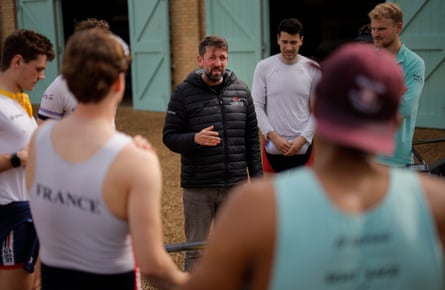
Rob Baker, the men’s chief coach, talks to his blue boat at their Ely training site.
Apart from an obvious role in the development of rowing skills, a key part of their job is making sure there is a balance for their student athletes. They understand they have to juggle training needs. “Every week we have a general plan,” says Baker, “but then someone might have an extra class or supervision they’ve got to do so we have to move around it. They are studying at one of the most competitive universities in the world with the highest standards so you’ve got to give them space to do that properly.” He goes on: “But when they get on the start line for their race, they’ll be just as competitive as if they were professionals.”
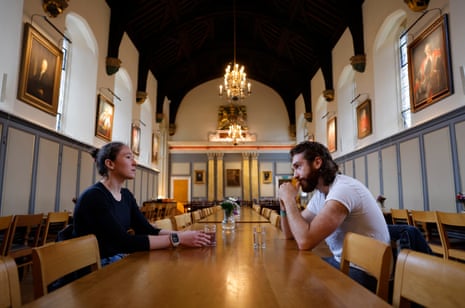
The presidents
Jenna Armstrong and Seb Benzecry discuss their plans in the Great Hall at Jesus College.
Every year one man and one woman are elected presidents to represent Cambridge University Boat Club. They are the captains and leaders, not only responsible for helping design the training programme in conjunction with the coaches but also making budgetary and tactical decisions along the way. This year both of them, Jenna Armstrong and Seb Benzecry, are from the same college, Jesus, which helps the communication between the two of them. They share ideas and knowledge, thoughts and worries. Their lives, for these intense few months, are a juggling act.
Armstrong is a 30-year-old from New Jersey, and doing a PhD in physiology. Once a very keen competitive junior skier she was forced to abandon her hopes of a career on the slopes after a number of serious knee injuries. She only started rowing in 2011 and only became aware of the Boat Race when she saw it on TV a couple of years later.
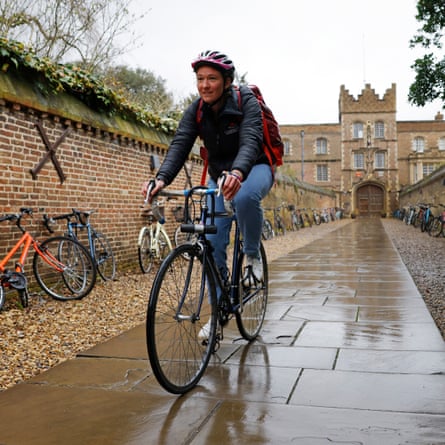
Jenna Armstrong, cycling down the Chimney, the grand entrance to Jesus College, to go to the other side of the city to carry out more of her PhD research at the department of physiology, development and neuroscience.
The research she carries out at the university labs could be turn out to be life-saving. “I study mitochondrial function in placentas from women from all over the world to learn how genetic and environmental factors during pregnancy can influence placental metabolism and impact the health of both mother and baby. I’m particularly interested in growth restriction which affects about 10% of babies worldwide. That can have lifelong implications for these babies and currently we don’t have any treatment for this.”
Benzecry, 27, is studying for a PhD in film and screen studies, and comes from a completely different rowing background. He grew up just a stone’s throw from the Boat Race course and went to a school on the banks of the Thames. This will be his 14th year of competitive rowing but his fourth and last Boat Race.
“ I remember one year my birthday fell on race day and we watched after my birthday party. Because we live fairly close to the course, I’ve always felt connected to the race.”

Seb Benzecry stands next to an Antony Gormley statue in the Quincentenary Library at Jesus College as he conducts research for his dissertation which forms part of his PhD in film and screen studies.
Talking about how hard it is to get the right balance between academic student life and rowing, Benzecry says: “I guess you have to accept there are many, many things you can’t do, you just don’t have time for during the season. You have to put the blinkers on.”
Armstrong says: “I have to be very prepared, very strategic and organised. I pack everything the night before, and then once I leave my room in the morning, I don’t go back. That allows me to go to training, go to the lab, go to training again. It’s surreal actually, to come to a place like Cambridge, have one of the best educations in the world on top of the most incredible rowing experiences in the world. We have a thing now in the boat, when we are doing something incredibly hard, I say this is my ideal Saturday, I wouldn’t want to be anywhere else. I would rather be here than in bed or on a date. And I make everyone else say it with me too. I’d rather be nowhere else.”
Benzecry states: “When it’s really bad, when training is so hard, we say Oxford aren’t doing this, they could never do this. It’s an incredibly powerful thing to be thinking we work harder than them, our culture is better than them. They don’t want to go hard as we do – they might think they do but they don’t, they just don’t have it.”
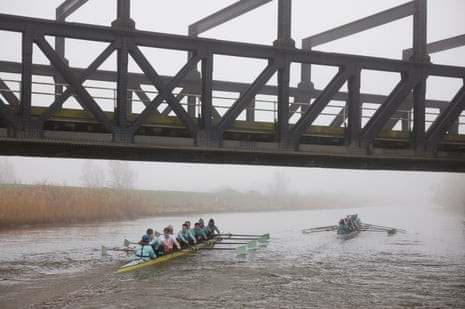
Integration
The men’s and women’s blue boats during a training session on the River Great Ouse in February.
Until 1 August 2020, there were three separate university boat clubs in Cambridge: one for open-weight men, one for lightweight men, and one for open-weight and lightweight women. Since they merged to become one club, it has undoubtedly helped with everyone sharing the same resources and motivating and inspiring one another. No one is more important and everyone has a key part to play in the result. This year, Oxford have followed suit.
Baker says: “I definitely feel, for the athletes themselves, it makes a big difference. They all feel like they’re contributing to one common goal. Every cog in the wheel has to do its job but for sure it feels like one big team on a mission.”
Benzecry explains: “We’re seeing each other train, we’re all out on the water at the same time, we’re supporting each other throughout the season, building a sense of momentum for the whole club towards the races. Everyone’s just inspiring each other all the time and I think that’s been such a sort of cultural shift for Cambridge.”

The men’s blue boat pack their craft on to a trailer at their Ely training site ready for the trip down to London for the Boat Race.
Siobhan Cassidy, the chair of the Boat Race, knows from first-hand how the integration has helped. She rowed for the Light Blues in 1995 and had a key role in the transition. “We could see the advantages of working together, collaborating as a bigger team, the positive impact we felt that could have on performance. But not just the output, actually the whole experience for the young people taking part.”
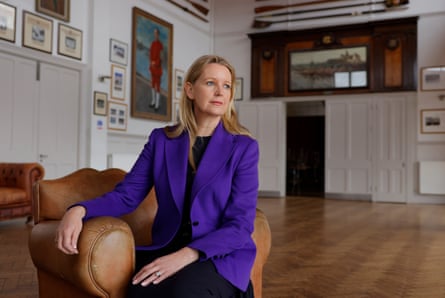
Siobhan Cassidy, the chair of the Boat Race, pictured at the Thames Rowing Club at Putney Embankment.
This Saturday, if the weather holds, an estimated 250,000 people, the vast majority of whom have no allegiance to one shade of blue or the other, will pack the banks of the Thames to see these races. It’s one of the largest free events in Britain. Broadcast live on BBC One, the race is also beamed to 200 countries across the world.
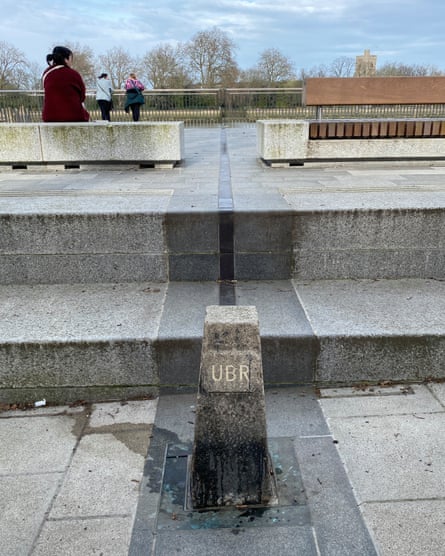
The starting stone for the University Boat Race and pavement inscription: “The best leveller is the river we have in common” at Putney Embankment.
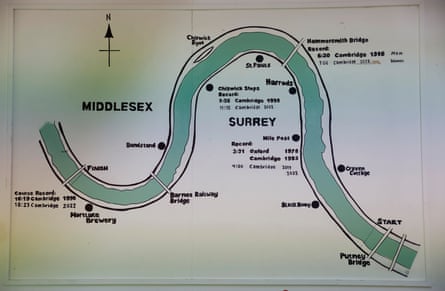
A map of the Boat Race course at the Goldie boathouse, with the Thames coloured in Cambridge blue and record timings written in for men and women showing almost total Cambridge dominance.
A sporting pinnacle being contested on a fast-flowing, unpredictable river by two teams of university students – it’s pretty bizarre. But maybe it’s that quirkiness that keeps the race, after almost two hundred years, still going strong. And even more bizarre to think that Cambridge, the current dominant force in the Boat Race, a sporting event that can’t shrug off its elitist stereotype, owes so much of that success to such egalitarian principles.
- The Guardian picture essay
- The Boat Race
- University of Cambridge
- Photography
Most viewed

IMAGES
VIDEO
COMMENTS
This Essay summarizes the FTC's response to the Cambridge Analytica-Facebook scandal. It concludes that the scandal focuses attention on the need to explore the potential for embedding due process-type inquiries and protections within the enforcement actions by regulatory agencies such as the FTC.
On 19 March 2018, Facebook said it was pursuing a forensic audit of Cambridge Analytica and other parties involved in the data misuse, but it stood down after the UK's Information Commissioner ...
Cambridge Analytica also used its "psychographic" tools to make targeted online ad buys for the Brexit "Leave" campaign, the 2016 presidential campaign of Ted Cruz, and the 2016 Trump ...
April 4, 2018. In March, The New York Times, working with The Observer of London and The Guardian, obtained a cache of documents from inside Cambridge Analytica, the data firm principally owned by ...
According to Aral, the Cambridge Analytica scandal could have "a potentially chilling effect on the very resource that we need to get to the bottom of the effect of social media on our democracy ...
During the 2016 campaign, Bannon was the Cambridge Analytical's vice president and Trump's senior adviser. In only 3 hours we'll deliver a custom The Cambridge Analytica Scandal: Overview essay written 100% from scratch Learn more. Cambridge Analytica succeeds in accessing data on Facebook through Aleksandr Kogan who was a Russian American.
Alexander Nix, the currently suspended CEO of Cambridge Analytica, speaks at a 2016 event in New York City. Nix and his firm are accused of misusing the personal data of 50 million people as part ...
In the space of seven weeks, Cambridge Analytica went from being the poster child for smart, data-driven electioneering to a pariah.In early May, the firm that once promised to "find your voters and move them to action" announced it was starting bankruptcy proceedings, as the "siege of media coverage has driven away virtually all of the Company's customers and suppliers" (bit.ly/2r1wwj1).
By John Herrman. April 10, 2018. The queasy truth at the heart of Facebook's Cambridge Analytica scandal, which is so far the company's defining disgrace of 2018, is that its genesis became ...
Kosinski never worked for Cambridge Analytica and never acquired Facebook data without users' permission. Taking Advantage of Facebook "Likes" As a doctoral student and deputy director at Cambridge University Psychometrics Center from 2008 to 2014, Kosinski worked with a colleague to investigate whether it was possible to identify people ...
Christopher Wylie, a whistleblower who worked at Cambridge Analytica before quitting in 2014, claimed on NBC's Today Show Monday morning that the firm was "founded on misappropriated data of ...
Statements from my research - which includes interviews with staff at Cambridge Analytica and SCL personnel, and documents they gave me, alongside essays contextualising and discussing what I ...
This Essay summarizes the FTC's response to the Cambridge Analytica-Facebook scandal. It concludes that the scandal focuses attention on the need to explore the potential for embedding due ...
Cambridge Analytica, a political data firm hired by President Trump's 2016 election campaign, gained access to private information on more than 50 million Facebook users. The firm offered tools ...
The Cambridge Analytica scandal exposed the tip of the iceberg which gave rise to the few scientific research undertaken on this topic (Afriat et al. 2021;Bakir 2020;Berghel 2018; Laterza 2018 ...
Christopher Wylie, who worked with Cambridge Analytica, alleges that because 270,000 people took the quiz, the data of some 50 million users, mainly in the US, was harvested without their explicit ...
Cambridge Analytica was established as a subsidiary of the private intelligence company SCL Group that was active in military and political arenas. The men who ran Cambridge Analytica and its parent SCL were described as having close ties to the Conservative Party, royalty, and the British military. [7]
2.0 Issue of data breach. Recently Facebook's data privacy scandal came into limelight where Facebook members' data were improperly shared with Cambridge Analytica, a data mining and political strategy firm. These data were accessed during Donald Trump's presidential campaign. Cambridge Analytica accessed the data for more than 2 years.
Cambridge Analytica controversy must spur researchers to update data ethics. A scandal over an academic's use of Facebook data highlights the need for research scrutiny. Misuse of information ...
Argumentative Essay Cambridge Analytica. We'll get back to you shortly. Your order needs a perfect match, so give us a few mins. A standard essay helper is an expert we assign at no extra cost when your order is placed. Within minutes, after payment has been made, this type of writer takes on the job. A standard writer is the best option when ...
You can have a cheap essay writing service by either of the two methods. First, claim your first-order discount - 15%. And second, order more essays to become a part of the Loyalty Discount Club and save 5% off each order to spend the bonus funds on each next essay bought from us.
The race along the River Thames between England's two greatest universities spans 195 years of rivalry and is now one of the world's oldest and most famous amateur sporting events. Our ...
Discerning The Mystery: An Essay on the Nature of Theology, by Andrew Louth. Clarendon Press, Oxford 1983 pp xiv + 150 £12.50. - Volume 65 Issue 769-770 ... first ensure [email protected] is added to your Approved Personal Document E-mail List under your Personal Document Settings on the Manage Your Content and Devices page of your ...
Authority in Morals. An Essay in Christian Ethics by Gerard J. Hughes S.J. Heythrop Monographs London, 1979. pp. ix + 136. - Volume 60 Issue 715